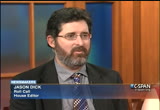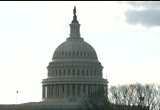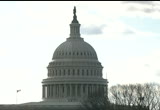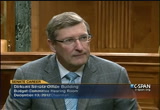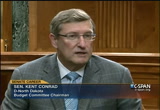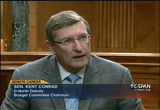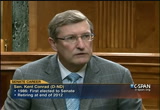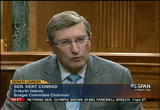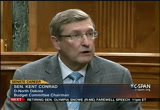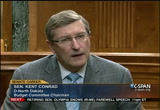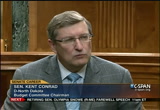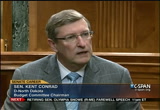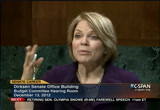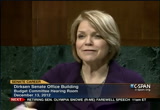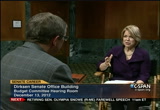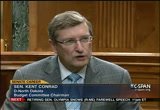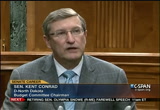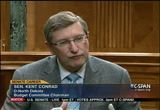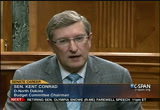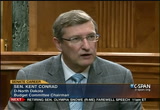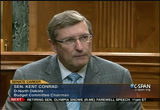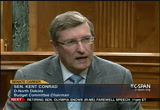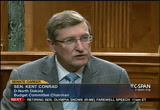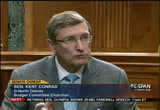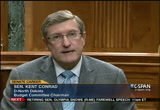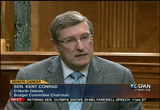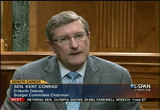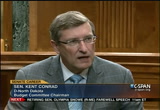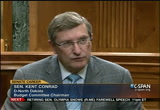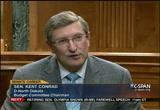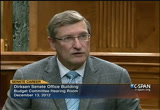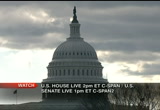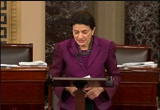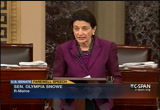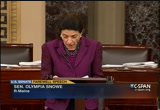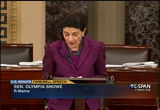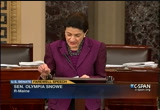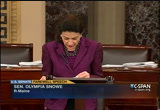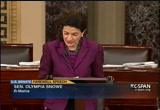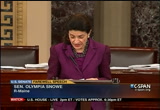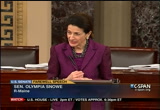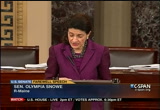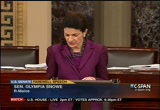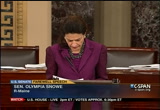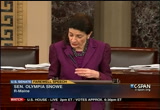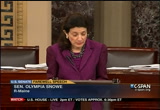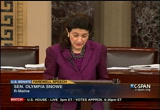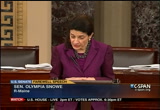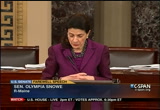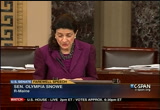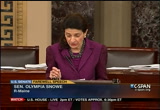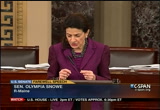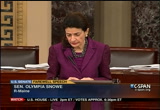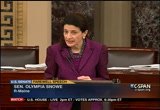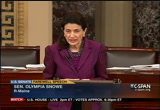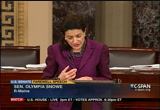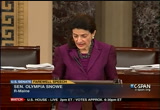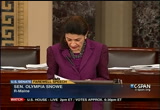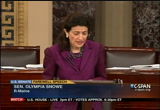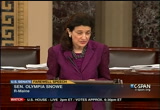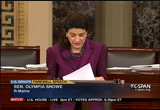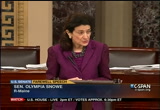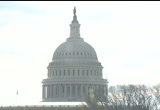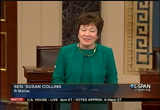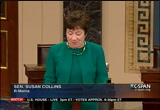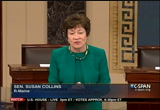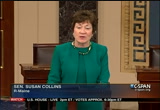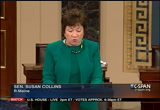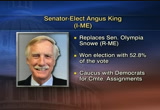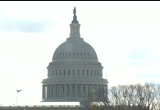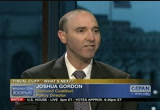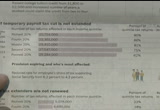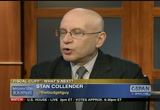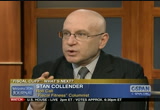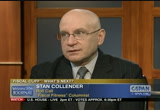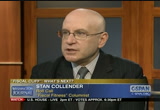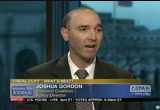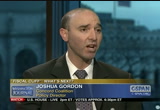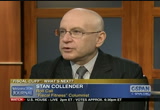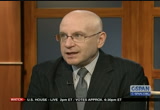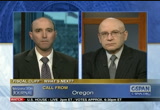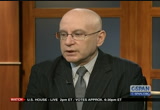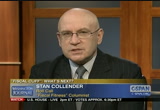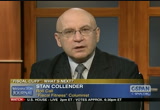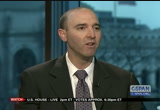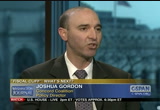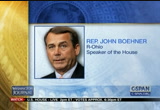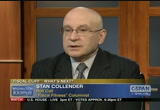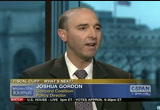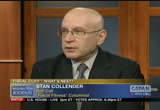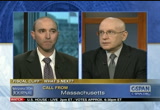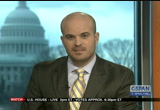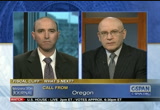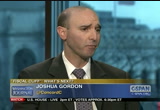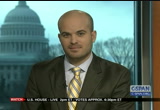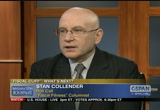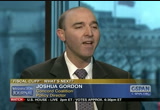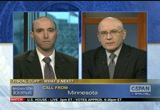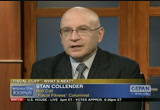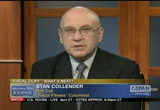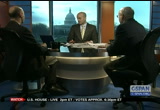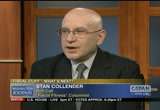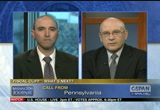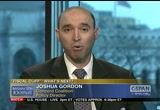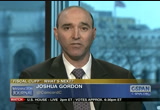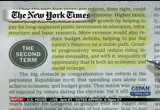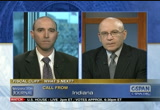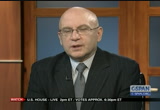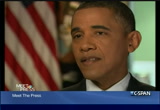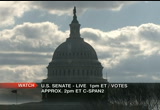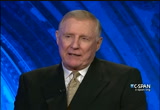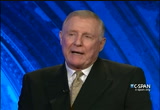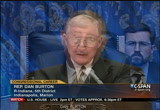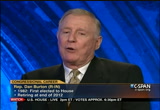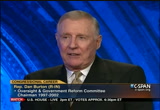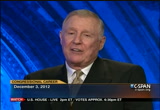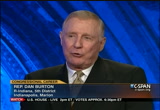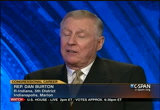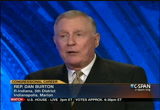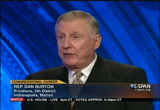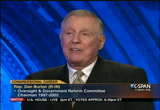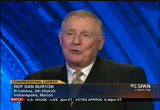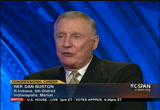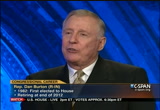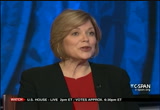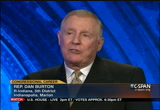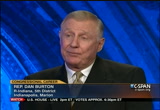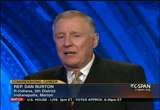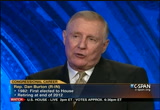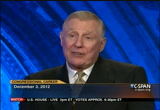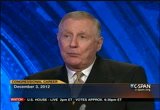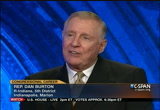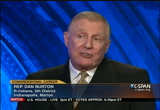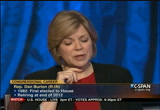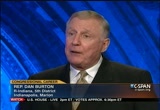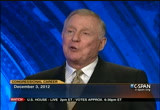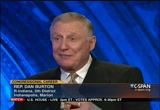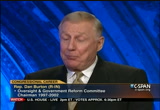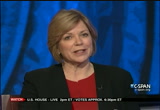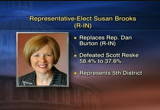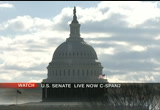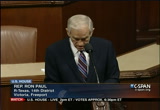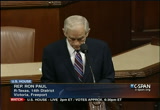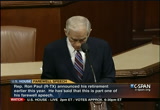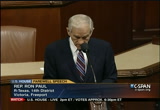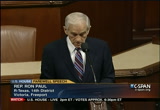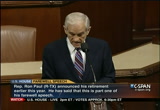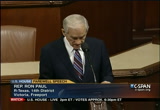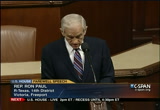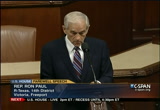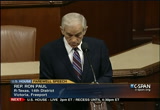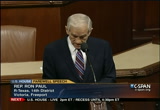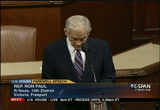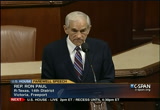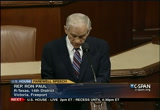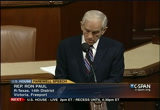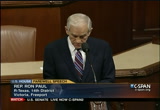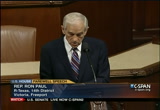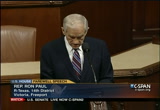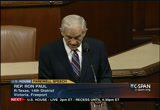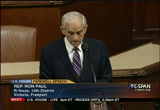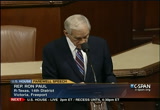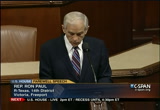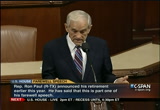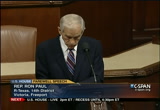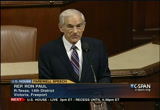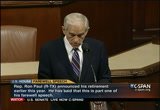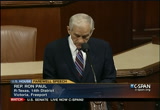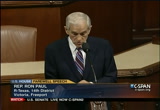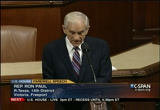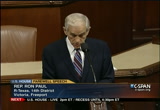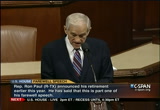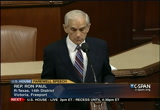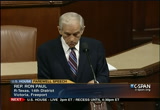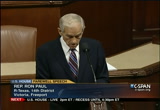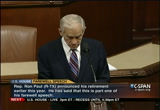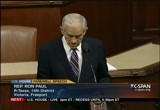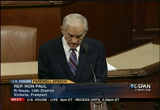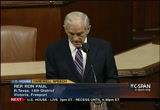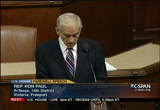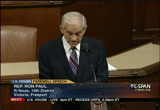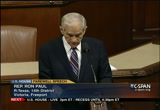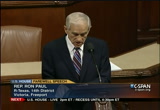tv Washington This Week CSPAN December 30, 2012 10:30am-2:00pm EST
10:30 am
people come out and huff and puff in public and then behind closed doors they're accepting the law of the land. lan but also begs the question of, do you want to spend your time trying to do the things it did not release him to pay off much in the last election? >> jason dick, emily goodin, thank you for being on "newsmakers." [captioning performed by national captioning institute] [captions copyright national cable satellite corp. 2012] >> we will show our conversation with luke messer today again at 6:00 p.m. eastern. coast chambers of congress are in -- both chambers of congress are in.
10:31 am
the senate is in at 1:00 eastern time. votes are scheduled at 2:00 p.m. eastern. majority leader harry reid and minority leader mcconnell had set a deadline of 3:00 p.m. when they're planning to convene a caucus meetings and update members of the parties on a possible plan for taxes and spending on the new year. will bring you live coverage of the senate on c-span2 started at 1:00 eastern. in the house, the return of 2:00 p.m. you'll be considering a number of pieces of legislation. what the live coverage of the house here and c-span. next, retiring senator kent conrad reflects on his career in congress to. it is currently senate budget committee chairman and was first elected to the senate in 1986.
10:32 am
this is about half an hour. >> senator conrad, your farewell speech was yesterday. what is that like? >> it has been great. i had the going away party the night before. a lot of my colleagues were there. then the farewell speech, in which i had a chance to reflect on my service here. but also, to challenge my colleagues to finish the job on the grand bargain to get our fiscal house in order. i laid out the specifics of what i thought would be a genuine compromise between the two sides. it was satisfying. >> why did you decide not to run again? >> many reasons. i have served your 26 years. less than 5% of senators in history have served the long.
10:33 am
part of it is, i am tired of living out of a suitcase. i missed a% of my wife's birthdays, 80% of our anniversaries. sometimes change is a good thing. after 26 years, i felt the need to have somebody else take these responsibilities. >> some people have written that the senate was not the same for you. >> that is true. my best friend, he and i have been together and political offices, a government responsibility for a very long time. more than three years. when he decided not to run again and my other colleague who was part of team north dakota was defeated, it was less rewarding
10:34 am
for me personally to be here. less enjoyable for me to be here. i am sure that played a role. >> in your speech yesterday, you used the expression of the senate we efforts right yesterday, as the world's greatest deliberative body. do you think the public shares that perception? >> probably not. [laughter] we're efficient at producing results. -- deficient at producing results. what i also said yesterday was a there are problems here. the problems i believe are very clear is that we spend too much time trying to seek political advantage, too little time focused on solving the country's problems. i am sure that had a role in my decision as well. i really came here wanting to do big things. wanted to work on solving problems.
10:35 am
there is been much less an emphasis on that lately and much more of an emphasis on how you get over on the other guy. i understand this is a team sport, a competitive environment we are in, but at the end of the day, if we're not solving problems, it is pretty of the. >> -- empty. >> can you trace the trajectory of the partisanship? >> i can see it very directly going back to 1994. newt gingrich, he had a view to take over the house of representatives, one hand to bring down the institution. things have never been the same since. that is not to say that there were not very deep folds of the democratic side, because there
10:36 am
were. -- fault on the democratic side, because tehrthere were. it has set off a chain of events and a dynamic year that i think is very unhealthy. i hope very soon that we get back to working together, understanding that there is a competition, and solving problems. that is what the country needs. >> how much a role has the money in politics played any ?artisanship and throa >> huge. it is a cancer on our democracy. what that means is individual members now have to spend even
10:37 am
more time fund-raising, even more time being entirely political in order to survive. that is extremely unhealthy. >> what about the public themselves? over the course of the last quarter-century, the country has become less aligned with parties, and that pushes the party's more to the extreme of many votes and 50-50. -- 50-50. >> it is a broad reflection of the american people. they choose who represents the here. they're deeply divided. -- them here. they're deeply divided. beyond that, you have the effect of media. the 24 hour news, the have all the time to fill. the look for the loudest voices to put on the air, the people
10:38 am
who say the most outrageous things. but also has played a very central role in how this has evolved. we've got to make some choices as a country here. are we going to reward the extremists, or are we going to look to the sensible center as the place where decisions need to be made? >> in some of these cases, it is what it is. the supreme court has ruled on campaign financing, and the media is here to stay. social media is here to stay. what do you see as a possibility? >> my own belief is actions. actions are needed. decisions need to be made. that requires leadership, people to step forward and say, look, follow me, and i will take us in a different direction. we're going to face up to these
10:39 am
things. then it is each individual's a choice. are they going to be a part of that, are they going to be a part of this endless food fight? >> a few historians have written books recently about the great senators, the great leaders of the past, and suggesting there fewer and farther between. with your study of this institution, this body, would you agree with that? >> i think there are many exceptional people here. i said in my farewell speech yesterday, i have enormous respect for this institution. the vast majority of my colleagues want to do the right thing. many times, doing the right thing, it is hard to know what is the right have to take in the midst of all of this conflict. -- half to take in the midst of all of this conflict. >> that is different from leadership. >> that is absolutely different
10:40 am
from leadership. what we need very much is leadership at every level. and that means from individual members as well. they have got to decide, are they going to be a part of the herd, or they going to stand up and say what they truly believe? and are they going to be a part of solving problems. at the end of the day, this needs to be what it is about. >> you expecexpressed optimism n your farewell speech. do you see signs here? >> my colleagues want a different direction. they want to be part of something that is producing results for the american people. i find republicans and democrats who really are like- minded in the sense that they want to produce results. >> we're talking in a room the u.s. but a lot of time in.
10:41 am
you came to the senate -- that uyoyou have spent a lot of time in. you can to the senate. what do you see as the legacy of time did you spend in this room? >> back in the clinton years, we were able to actually balance the budget, we treated the longest period of uninterrupted growth. -- created the longest period of uninterrupted growth. and we were paying down the debt. in recent times, i've been part of a nonpartisan commission to resolve these debt issues. there we had 11 of the 18
10:42 am
members agree on a plan to the country back on track. i still believe that is probably the best blueprint for going forward. i was also part of the group of six that became the group of eight, evenly divided the dream republicans and democrats. -- that between republicans and democrats. >> lots to go back with. let me start with the 1990's. how much of that success was the bursting economy with the tech bubble that was happening that brought more money into the coffers? >> all of these things are connected. that is my belief. governmental policy, what happens in the private sector.
10:43 am
because we were showing that we could get results, the government could make decisions, that gave additional confidence to the private sector. there was additional certainty, because people knew what the rules of the rubber going to be for extended period of time. -- of the road were going to be for an extended period of time. that unleashed corporate funding. i have had corporate leader after corporate leader telling me, part of the reason they are not unleashing that money in a new wave of investment is because of uncertainty they do not know what decisions are going to be made here. -- uncertainty. they did not know what decisions are going to be made here. >> there are other gangs and groups of this and that have been formed in the past five or six years in the senate. how much of that is an indication of the institution not working as it should?
10:44 am
>> when you have major problems, these groups tend to form. there is a long history of that here. going back to andrews air force base and the budget deal that was entered in their with president bush 41. when there are very complex financial matters, these special groups form because people have to spend a lot of time to get the whole work done and to get an understanding of how these complex questions can be resolved. i do not think that is so much a reflection of this function as it is historic president on how things get done here. >> when you look back historically as some of these other bipartisan commission's for other groups, you mentioned the andrews air force base. during the reagan administration, the commission that found the solution for social security, the base
10:45 am
closing commission -- each of these were big public forums where the discussions happened in front of the public and they still found a way to reach accord. almost everything now seems to be happening behind closed doors. why could openness and discussion of these issues have been in years past, and now today we cannot seem to get the deal in public arena? >> it is in large measure because the media has so changed. in those days, you did not have 24-hour coverage. what you find with 24-hour coverage, if an idea services at 10:00 in the morning, it is dead by 2:00 in the afternoon because everybody goes to the cameras. the cameras are there. ever-present, wanting to hide something. before and ideas even fully
10:46 am
developed, debated, it is dead. you really see that around here. >> as to specifically the simpson-bowles commission, there's been a fair amount of criticism on the president for not embracing the findings of that commission. >> i advised the president not to embrace the specifics. i feared that house republicans would automatically be in opposition. if you are part of this commission, you saw that dynamic. there were 18 of us. six representing the president, six representing the u.s. senate, six representing the house. five of the six representatives of the president voted for the recommendations. five of the six representatives of the u.s. senate, republicans and democrats, voted for the recommendations. five of the six representing the house voted against them. both d's and r's.
10:47 am
it kind of tells the story. >> what does it tell? >> [laughter] that the house that is posted on every two years is far more reluctant to make unpopular decisions -- voted on every two years is far more reluctant to make unpopular decisions. >> does the institution still work for society? >> i think if the term was extended from two years to four years, that would give them the ability to get this back on track. if you are cutting programs and you are raising revenue, you're upsetting people. you are doing things that are not popular.
10:48 am
to go back to your constituency and say, but i am going to be doing now is i am gonna to be cutting spending and a program that is very popular. at the same time, i am going to be raising revenue, which means raising somebody's taxes. at one point, we were borrowing 40¢ of every dollar we spend. at least we have made some improvement. dollars being31¢ bein borrowed for every dollar we spend. we know that the trend line is not our friend. the revenue base is inadequate for meeting what has been the social compact -- social contract, to have social security, to have health care provided to the least our seniors. now more broadly to a guarantee that everyone would have health care coverage.
10:49 am
this is a challenging time for those who seek to represent their states and districts. >> listening to one of the many press conferences happening in this town, a reporter described where we are right now as a situation of washington post own making. -- washington's own making. how did we get where we are right now? >> on the revenue side, you go back to the bush years. when they passed the bush tax cuts, for various procedural reasons, they wanted to shoehorn as much tax-cutting as they could into a 10-year period. because of the rules, they really went overboard, did much more in the way of tax cutting and we could afford. it was very apparent at the time that they did it.
10:50 am
they sun-setted it all after 10 years. the same is true with the so- called sequester. across-the-board cuts of $1.20 trillion, focused on domestic spending, was put in place to try to provide leverage to the special committee that if it did not reach agreement, the sequester would drop and do something that nobody favors, an across-the-board cut. no distinctions, no prioritize nation. just to cut across the board. -- prioritization. just to cut across the board. >> going back to the bush
10:51 am
years, what is congress's role in this? >> i vigorously and energetically opposed it. i said to my colleagues, this is going to lead to trouble. i laid out in great detail where i thought it would ultimately lead us. and here we are. somebody said to me the other day, don't you sometimes feel like saying, hey, i told you so? it doesn't do any good. i do feel somewhat vindicated and that alan greenspan wrote in his book that he wished he had listened to my advice. it has not added up cargo during the same perio -- added up. >> during the same period, we
10:52 am
had a two board sort of budget. >> -- two off-budget wars. >> shame on us. we of collectively made decisions -- and i thought going to iraq was a big mistake. it had nothing to do with the attack on united states in 9/11. but there was an amazing amount of confusion in the country. people somehow believe that iraq was behind 9/11. it was all kind operating out of afghanistan. -- al-qaeda operating out of afghanistan. another very serious misjudgment they're paying for. >> we have about 10 minutes left
10:53 am
with you. i want to switch topics. he has also been a big step in of energy policy -- champion of energy policy. discovery of natural gas in your state has changed the economy. where do you think this new discovery of this resource is going to lead us? >> i did it is incredibly positive for the united states. we of gone from 60% foreign energy dependence down to 40%. there are a lot of projections now the we could become energy independent over the next several decades. that would be an incredible boon to this country. instead of sending $400 billion or five order billion dollars abroad every year to buy scarce energy supplies for people who do not particularly like us, we could be spending that at home. think of the difference that will make to the economic
10:54 am
strength of united states. think about what it will mean to job opportunities, the economic strength of america. natural gas is a very clean resources compared to many of the other options. our progress . on reducing dependence has also been on grenoble's. -- progress on reducing dependence has also been on renewables. all across north dakota, you see these giant went generating machines. -- wind generating machines. on top of that, increased fuel efficiency in cars, a dramatic improvement with much more to come, is reducing our demand for fossil fuels. these are all extremely positive developments for the country. >> what does it mean for your home state?
10:55 am
>> a vibrant economy, the lowest unemployment in the country. the highest purchaser plus per capita of any state in the nation. -- surplus per capita of any state in the country. >> over the years, you've been in a champion of the state's agriculture. i am interested in you having square your pride to bring home resources to north dakota with all this concern in united states you have expressed. >> it is easy to do. the farm bill we just passed reduces the deficit $23 billion. the last farm bill we passed that was completely paid for at my insistence as budget committee chairman. everybody else was functioning we faced up to reality. secto
10:56 am
in this farm bill, even far more in the way of deficit reduction. it demonstrates this is possible to do. but you have got to have leadership. and you've got to have people who are willing to make some tough decisions to get it done. >> we have about five minutes. i want to talk a little more personal. you have decided to leave your papers of public service to george washington university. why is that? >> i got my master's in business there. they have tremendous resources there to take advantage of this collection, which is loaded with history. >> what kind of things will researchers and historians find? >> the will find that tim conrad has had a single-minded focus
10:57 am
on fiscal responsibility for 26 years. [laughter] my staff says that a remarkable thing in looking at this collection is how consistent i have been but pay attention to fiscal responsibility and making sure that certain things add up. they say that they find my handwritten notes from day after day. and make a list every day of what i want to try to get accomplished that day. they said almost every day, at the top of the list is, deficit. get the deficit under control. until we actually did it in the 1990's. and why did i have this single- minded focus? i have always understood, the most important responsibility of government is economic security of the people. if you do not have your fiscal affairs in order -- we learned in the economic downturns in my state, the debt to work for you.
10:58 am
it can also question. -- the debt can work for you. it can also crush you. i do not want to see the country go through the same kinds of problems. my family lived through the great depression in the 1930's. it exacted a terrible toll on the people in my state. i have always been very focused on economic growth, economic opportunity, and being responsible with the resources that you have. >> we a frequently heard from the republican candidate but this country could become like greece. do you see that as a possibility? >> no. it is a profoundly different situation. i do see the possibility that we could have debt that would truly be harmful. the congressional budget office says if we stay on the course we're wrong, we will have a debt
10:59 am
that is 230% of our gross domestic product over the next 20 years. most experts say, once you get a debt of more than 90% of your gross domestic product, that inhibits future economic growth. this is not just about numbers and a page. it is really about opportunities for people. whether you're going to be able to send your kid to school, some of the college, whether you're quite able to buy a car, buy a house, start a business and have it succeed. whether or not you're going to have economic opportunity for the people of the country. we know with the best academic research that has been done that if a country's debt it's too large in relationship to the size of its economy, the economy does not grow as fast. opportunity is lost. jobs are lost. there is a similarity to what is
11:00 am
happening in europe with what could happen here if we do not get our house in order. but we certainly are not greece. >> enough talk about this single-minded focus. and yet you -- you have talked about this single-minded focus. how do you feel about leaving at this particular point in time? >> we still have several weeks. we have laid out the plans. all these efforts i have been part -- all of these efforts that i have been a part of. one reason i did not run again is because i wanted to focus these last two years. i knew if i was running i would not be able to be in the hundreds of hours i have been a part of. they developed a work product to those who are negotiating. many of the ideas we generated will be part of a solution before the end of this year or
11:01 am
early next. the work product we produced will be a part of the solution. >> you talk about missing 80% of family birthdays, but will you -- what will you be doing next? >> i don't know. some speaking, some teaching. one thing i can assure you i will not be doing is lobbying. beyond that, i have made that clear that it is not in my interests. it is not what i'm going to be doing. >> there are ways to lobby without being a registered lobbyist. will you stay in washington? >> my wife has her dream job, representing major league baseball and is on the sports coalition. i am from north dakota through him through.
11:02 am
we will be going back-and-forth ala. -- a lot. i have committed to the speaking tour but that is it. beyond that, i don't know. maybe journalism. >> the way you said that, i doubt it. do you have any sense when you first turn on the tv to watch the senate and what will your reaction be? >> relief. [laughter] i will miss the opportunity to participate in debates. i have done this 26 years and i'm really ready to do something new. i will be respectful observer of what goes on here knowing how difficult is to get a result there and do your best and faithfully represent people who have sent you here. >> thank you for spending time with us. >> i enjoyed it.
11:03 am
>> senator conrad will be replaced by heidi heitkamp. she will be the first woman senator from north dakota elected to the office when she takes office next week. both chambers of congress are in today for ron finished legislative business including a possible deal on the fiscal cliff. the senate will be in at 1:00 eastern. though it's in the senate are scheduled for to o'clock p.m. eastern. according to "the washington post" perry began mitch mcconnell have set a deadline at 3:00 when they will be convening caucus meetings and that date members for a possible plan on taxes and spending. president obama was on "meet the press of" today saying the pressure is on congress to make
11:04 am
a deal. he was optimistic, but he said that they cannot come to an agreement, he wants the senate majority leader to introduce legislation to make sure middle class taxes stay where they are. live coverage of the senate on c-span2 when the gavel in. the house out to woodcock with the boats as early as 6:00 looking at a number of legislation from veterans to foreign aid. you can watch the house live here on c-span. >> republican olympia snowe from maine is also retiring at the end of the 112th congress after three terms. next, her farewell address. it is about 35 minutes. >> i rise today with an infinite appreciation for the institution of the united states senate as well as a profound sense of gratitude.
11:05 am
as i prepared to conclude my 18 years in the senate and my nearly 40 years in elected office on behalf of the people of maine. madam president, it has been difficult to envision the day when i would be saying farewell to the senate. just as it was impossible to imagine that i would one day become a united states senator as i was growing up in maine. such is the miracle of america that a young girl of a greek immigrant and a first-generation american who was orphaned at the age of nine could be elected to serve in the greatest deliberative body the world has ever known and become the third longest serving woman in the history of the united states senate. in contemplating how to begin my remarks today, i am reminded of the words of the renowned pellett -- poet, ralph waldo
11:06 am
emerson. give thanks continuously. because all things that contributed to your advancement, you should include all things in your gratitude. that perfectly encapsulates how i am feeling on this day, madam president -- thing fall and last. i first and foremost want to thank the people of maine for allowing me to be their voice, their boat, and their champion for 16 years in the -- their vote in the u.s. house of representatives and for three terms in the senate. one definition of the word trust is a faith of confidence in a duty or post. to have the confidence of the people who have placed their confidence in me is an honor of indescribable magnitude. in serving my state for the past 34 years, it has been the
11:07 am
greatest privilege of my life. i also want to thank my amazing husband, josh, up there in the gallery. he is a former congressman and former gov. of maine. while he was governor and i was in the house of representatives, we used to joke our idea of quality time would be listening to each other's speeches. truly, we share a passion for public service and a unique journey together with 56 years between us in elected office. we have never regretted a single moment. he is joined today by a very wonderful long time friend, dan and sharon miller, from maine. i also think of my family without whom none of this would be possible. often joke the secret to my electoral success is coming
11:08 am
from a large extended family. some of them started on campaigns that burst -- at birth. they have been there for the struggles of the well as the celebration then i find them from the bottom of my heart. it is hard to serve at what -- at this level so long without such a dedicated staff and i have had 400 people have made such a difference for me, for man, for washington. we have had tremendous support for the inviable efforts on the part of my staff and the extraordinary events of more than three decades. they have represented the very best and brightest the nation has to offer and they are here today in the back of the chamber and up in the gallery. i applaud them time and time again.
11:09 am
we have a wonderful reunion of all of my staff and i realized it simply would not have been possible to go on this legislative journey without them. to my staff in maine, who have not only been my eyes and ears, but they have been stalwarts to words for my constituents. they have never been inclined to take no for an answer. in so, they have helped thousands of lives by brightening the darkest days. i thank the staff of the united states senate, ensuring the operation and the senate here on the floor to the cloak room staff, legislative counsel, to all of the pages here from all across america, to all those who actually keep the facilities running, and certainly to the offices on the front lines -- the officers on the front line. you have my deepest admiration
11:10 am
for your contribution to the senate and our country. i want to express my gratitude to the minority leader for his gracious remarks about my service. senator mcconnell has worked tirelessly to lead us in the country. the longevity of experience ha made him a tas this body for us and i have theheartd appreciation for its contributions to his home state of kentucky and to this country. to my friend and colleague, susan collins, i want to thank her for her kind and generous words from the floor last week. public-service has been imbued in her from her early days in care bill -- caribou, maine. for the past 16 years, senator
11:11 am
collins has provided exemplary representation for not only man but for america with her voice of reasonable, pragmatism, awful mess. maine will be in it in good hands with susan collins as our senior senator. i am also grateful to my friend, senator mikulski, for her warm and wonderful comments she made yesterday on the floor. i have known barbara for more than 30 years beginning with our mutual service in the house of representatives. she is truly a dynamo who has always brought to bear and a tenacity that has been reflected in her vigorous advocacy for those -- it brought to bear a of a vigorous tenacity in her advocacy. there is no one i would rather have to pass on nussle legacy
11:12 am
and what a reflection in her legislative stature that she has assumed the mantle as the longest serving woman in the history of the united states congress. to madame president and the chair, i have enjoyed serving with you as well in this august chamber and getting to know you. i hope to know you well into the future. i have enjoyed working with you over the years. senator isaacson, my neighbor, a gentleman in every way. he has been magnificent to work with. and of course my colleague, senator rakowski from alaska. i want to thank of them and i have enjoyed working with them and getting to know them. to all of my senate colleagues,
11:13 am
past and present. this chamber would just be another room, fancy walls, without the life blood, passion, it service, and dedication you bring to this nation. we all have our stories about what shape our values and aspirations and why we care so much about public service as a vehicle for securing for others the american dream or all who seek to embrace it. in my instance, my own legislative journey commenced when i was elected to fill my late husband's seat in the house of representatives in maine. i felt then, as i do now, that our role as public servants, above all else, is to solve problems. i have often reflected on my six years in the state house and senate in augusta, maine, because that is when i found politics and public life to be positive endeavors.
11:14 am
once elections were over, my colleagues and i left the campaign is behind us to enact laws to genuinely improve the lives of mainers. i also inherited a legacy of bipartisanship and independence from a woman who is remembered for marks from her second year in her first term. she telegraphed the truth about mccarthyism during the 1950's with her renowned declaration of cience speech. she had done what 94 of her male colleagues had failed to do. she enslaved the giant of a demagoguery. i do not simply go with the flow
11:15 am
and i tell them not to take it personally. i cannot help that i am from maine. that is what people truly expect from their elected officials. they expect you to do what is right for the right reasons and the right way. we have seen the reflected time and time again, not only with margaret smith, but in the distinguished service of great senators who have preceded me to bill cohen and george mitchell. throughout my tenure, i have borne witness to the incredible potential of government. i have also experienced the capacity for serial this function. indeed, as i have stated in announcing i would not seek a fourth term in the u.s. senate, it is regrettable that the political polarization in washington today is prevented us from tackling our problems in
11:16 am
this time a monument of consequences for our nation. as it prepared to conclude my service in elected office, let me be abundantly clear. i'm not leaving the senate's because of ceasing to believe in its potential or that i no longer believe in the institution but precisely because i do. i am taking my commitment to the senate in a different direction. i intend to work from the outside to help build support for those who will be working to reestablish the senate as a place of refuge, a forum. as our founding fathers to me intended, the -- truly intended, this is our legislative mechanism with the vast
11:17 am
ideologies so that we might arrive at a solution to the challenges that we face. we are a can do country confused with that spirit. it's in our blood and in the very being of who we are. it is in the hard-working families and the limitless entrepreneurship of our people and it is profoundly reflected in the heroic men and women in uniform and i have been privileged to witness them firsthand throughout my tenure answering the call in places like iraq and afghanistan with many having made the ultimate sacrifice so that we may live and so that freedom of my always rain. here in the chamber, i have spoken to many of you and you came here to get things done, to solve problems, achieve great
11:18 am
things for our nation. i have heard you laments the inability to accomplish more in today's polarized atmosphere. as i have travelled throughout maine and america, even overseas, people would stop me and ask what has happened. hasn't always been this way? i tell them, i am so passionate about changing the tenor in congress because i say that it can be different. it has not always been this way. it absolutely does not have to be this way. i've been in congress long enough to have experienced firsthand what can be accomplished when individuals from various political backgrounds are determined to solve their problems. for instance, when i first came to the house of representatives in 1979, i join the bipartisan congressional caucus on women's issues which i ultimately
11:19 am
cochaired with pat schroeder. we did not agree on everything, but with only 17 women in the house and senate, assembly could not afford to drop political when it came sigabndnd too important women's issues. we spoke as women. that is what drove our agendas in the caucus and together we started to make a real difference for women. you have to understand. there was a time in america when child support was viewed as a strictly a women's problem. a time when tensions were canceled without a spouse's approval. a time when family and medical leave was not a tsign of the land. there were trial that made the difference between life and death that the national
11:20 am
institute of health. as my colleague eloquently described yesterday, she was running the battle for equity in the senate what congresswoman --hroeder and morello were i'v were fighting with i in the house. the shocking treatment further galvanized attention. we've produced the largest clinical study trial when it came up to women's health producing results even today as well as watershed policy changes resulting in lifesaving medical discoveries for america's women. in the house, we also worked across party lines to craft a federal budget in sharp contrast to today's broken problems where we cannot pass a budget in three years even with unprecedented
11:21 am
debt and deficit. when president reagan was elected in 1980, he knew he had to build coalitions to pass a budget that would address the tumultuous economy. the result was that the moderate northeast republican group, the gypsy, and the boll weevils negotiated budgets together to help reconcile our political and regional differences. the model for bipartisanship, all of us, spent days and weeks fashioning budgets, literally going through the budget function by function. madam president, are arriving at a compromise was not easy by any means. it never is. the point is we can undertake the difficult order if we choose to do so. i was able to make a difference even as a member of the minority
11:22 am
throughout my entire 16 years in the house of representatives by reaching across the political aisle. in 1995 when the voters of maine interested me to be their voice and vote in the senate and i was finally serving in the majority, i believed the cooperative this position would remain an indispensable commodity in meeting the challenges of our time. that is why i joined the centrist coalition shortly after arriving which was formed by then senators jon casey and john brown. during the 1994 health reform debate to reach the political divide. after he passed away, we thought it was imperative that we revive the coalition to help the bipartisanship following the divisiveness of the senate impeachment trial. following the landmark supreme
11:23 am
court ruling in bush vs. gore that adjudicated the presidential election and evenly split senate with 50 republicans and 50 democrats, senate leaders joined with nearly one- third of the senate at a meeting of the centrist coalition to explore how to move forward in a bipartisan fashion. it is precisely this kind of approach that is crucial, madam president. it is only when we minimize the political barriers that we can maximize the senate allowing it to become an unparalleled incubator for results that truly matter to the american people. it was a cross aisle alliance that produced the program that was a rewrite of the telecommunications act for the first time. this was a landmark law insuring
11:24 am
every library in classroom in america would be wired to the revolutionary resources of the internet which one publication has ranked as fourth in a list of innovations and initiatives that help shape education technology over the past generation. senator rockefeller, who was privileged to work with on so many issues, with doggedly determined to enact this benchmark initiative. in typical fashion, he was not going to take no for an answer which made us it perfect coauthors as i was equally determined. by working with members of both parties were willing to judge on the merits, we overcame the hurdles and the program was born. during the 2001 tax debate, senator blanche lincoln and i, as members of the finance committee, joined together to increase the amount of the child
11:25 am
tax credit and make it refundable so that they could still benefit from the credit. ultimately, the measure was enacted becoming the second refundable tax credit ever and in ensuring the child tax credit would exist with an additional 13 million more children and with 500,000 of them out of poverty. madam president, i also think about my friend, senator landrieu, sitting in the chamber roswell and how we formed the senate common ground coalition again to rekindle cross-party relations. not only have we made history as the first women to serve simultaneously as chair and ranking member in a standing committee for the entire congress, but we worked together on numerous measures assisting america's greatest job generators, our small
11:26 am
businesses. in a shining example of what is possible with civility and a bipartisan team worked, senator ted kennedy and by co-authored the landmark genetic nondiscrimination act to stop insurance companies from denying and dropping coverage based on genetic tests on individuals would not forego those potentially lifesaving tests. at that juncture, democrats were in the majority. he approached me and he said essentially because of my work on the legislation, that had made possible, it should have been kennedy-snowe, a magnanimous gesture from the legislative lion. it passed in 2008 and has been the first major civil rights act of the 21st century.
11:27 am
madam president, there are templates to work together effectively in the united states senate on behalf of the american people, but on occasion, it is the very institution of the senate itself that is preserved when we stake out common ground. even in the highly charged atmosphere of the presidential impeachment trial, we made the process work. during a gathering of the republican caucus, i advocated holding a bipartisan meeting in the old chamber getting the entire senate to generate an agreement on the con docked. the senate had been about to decide the trial on a purely partisan basis, but by convening both parties, we were able to chart a logical, reasonable, judicious course. in 2005, i joined the so-called gang of 14 comprise the seven
11:28 am
republicans and seven democrats to spearhead with john warner, john mccain, and ben nelson. it was born to avert an institutional crisis as a result of repeated, systematic filibustering of president bush's judicial nominees in the senate. in response, the republican majority were going to exercise the nuclear option and it would have jettisoned longstanding rules requiring 60 votes to end a filibuster. the 60-vote threshold has always been protecting the rights of the minority, but when it becomes just a simple majority vote? how that happened? it would have had enormous implications for the future of the senate. just as we were about to cross
11:29 am
the political rubicon, the gang of 14 forced a pact based on mutual trust that we would only support a filibuster under what we labeled as extraordinary circumstances and we would oppose the nuclear option. it embodies the very manifestation of the power of sense is building. as this body contemplates changes to its rules in the next congress, i would urge all my colleagues who are returning to follow the gang of 14 and exercise a similar level of caution and balance because what makes the senate unique, what scituate's of this institution better than any other to secure the continued greatness of our nation is that balance between the accommodation of the minority and the privacy of
11:30 am
majority rule. regardless of who is in the minority, the ability to debate and shape legislation is paramount to silencing millions of voices and ideas critical to developing the best possible solution. madam president, as i have mentioned all of these examples as illustration to the boundless potential of the senate. they are not insurmountable if we refuse to be retractable. what is in the best interests of the united states of america. as far back as the fledgling days of our nation, our founding fathers warn the dangers of on their allegiance, a potential that alexander hamilton and james madison specifically cited in the
11:31 am
federalist papers. one study by three political scientists put congress at the highest level of polarization since the end of reconstruction in 1877. it is true in the intervening years that we have had no tools to settle disagreements and no canings have occurred in the early years, although there was a physical brawl on the floor in 1902. the fact that we are still more polarize now than at any moment in 140 years speaks volumes. instead of focusing on issues as the senate was uniquely established to do, we became more like a parliamentary system where we simply vote in political blocs. we have diverged from the traditional roles in norm that
11:32 am
is entirely contradictory to the historical purpose of the senate and the role of the founding fathers intended in the senate to play. the very name of the institution of the senate derives from latin roots meaning the council of elders. they represent the qualities of experience and wisdom. not just some experience and some wisdom in a deliberative body, but more experience and more wisdom in the highest deliberative body. for thousands of years, a senate has stood as an assembly were the lessons of individual experience are transmitted by measured wisdom and stable,
11:33 am
collective judgment. therefore, understanding of your patience, appreciation for tolerance, and a consensus for moderation are all required to reach such judgments and to do the work of the people. indeed, i would argue it is only by recognizing and striving to meet the institutional ideals of the senate that we can conspire to meet these. we all took an oath to support and defend the constitution of the united states. thislways believed includes a duty to support and defend the senate as an institution and the integrity of its derivative crosses. that required the ability to listen before judging, the judge before advocating, and to
11:34 am
advocate without polarizing. it also includes a capacity to differ with one's own party and to reach agreement with compromises with one's own party if on able to prevail. does the leadership necessarily requires all to recognize the individual duty to serve the people best my serving her chamber with the higher standards of consideration, the liberation, and explanation. former supreme court justice once said, and i paraphrase, that all of the court spared cases are divisive because one set of values are truly at odds with another in the constitution gives no simple rule of decisions for, in truth, we value liberty as well as order. we value freedom as well as
11:35 am
security. we value experience as well as a quality. in tough cases, they have a hard job of choosing, not between those things that are good and evil but between the many and often competing good things that the constitution allows. justice souter could have been talking about the work of the senate and the often difficult chase's -- choices we, too, often make. this defines those difficult choices but we resolve to rely on meaning, reason, and a reputational integrity of the process to explain the ultimate decisions. indeed, the justice concluded his remarks by saying that he knew of no other way to make good on the aspirations to tell us who we are and who we need to be as the people of the united
11:36 am
states. we of witness the heights the senate is capable of reaching when it adheres to its founding precepts. think about how we can together in the catastrophic events after 9/11 to help heal our nation. think about the major debates of the 20th century on such a watershed issues such as the establishment of social security, medicare, and the civil rights act. none of these profound advancements would have been in the fabric of our society today if they had been passed simply on a party-line vote rather than the solidly bipartisan basis on which each of them was enacted. madam president, i am not claiming there was some kind of age of bipartisanship where everyone sang from the same month a split of handbook.
11:37 am
i am not advocating this as an and the of itself. what i-- as an end of itself. cooperation in the past has resulted in greater achievement which likely never would have occurred if bipartisanship had not intervened as a means to obtaining those most were the -- worthy ends. this was from the particular compromises and the level of urgency required in the times in which they were forged. recently, a columnist at "the new york times" summarized this well when he said that there were policies that are not permanently right and that situations differ. tax cuts might be right one decade but wrong the next. tighter regulations might be right one decade but is
11:38 am
corrosive steps in, the regulation may be in order. madam president, as we confront the confluence of issues known as the fiscal cliff, we are at a moment of major significance and requires the application of principles that brooks describes. for the sake of the country, we must demonstrate to the american people that we are capable of making the big decisions by putting in place an agreement and a framework to avoid the fiscal cliff before we adjourn this year. madam president, we are surrounded by history perpetually here in the senate as well as throughout the capital. how could we not be inspired by its rise to this occasion? indeed, if you know history you understand very story of america's most formative days were defined by an understanding
11:39 am
that effective governance required the building of consensus and that such consensus is achievable even after the exercise of passionate advocacy. in conclusion, this brings us back to the creation of the document we all cherish and revere -- the united states constitution. 225 years ago, 55 leaders from divergent geographic and biographical background converged in philadelphia to draft the new structure of government to strengthen our fledgling company -- country. these were no shrinking violets. they had lived their lives to forge a government with liberty and justice for all. they were strong-willed and unabashedly opinionated. they disagree down argued about a great many things, both petty
11:40 am
and consequential. thomas jefferson even considered virginia and not the united states as his country. and yet, by september of that year, 39 of the original delegates signed the most enduring and ingenious government document the world had ever known, the constitution of the united states. 55 people who shared identical viewpoints did not gather together and rubber stamped there unanimous thinking. it happened because these visionaries determined that the gravity and the enormity of the common goal necessitated the courage to a advanced decision making through consensus. madam president, i worry we're losing the art of legislating. when the history of this chapter in this senate is written, we do not want to conclude that it was
11:41 am
here that it became an antiquated practice. as i depart the senate that i love, i urge all of my colleagues to follow the founding father's blueprints in order to determine -- to return this institution to its higher calling, governing through consensus. it is only then that the united states canceled the demand of our time, the promise of our nation and the rightful expectations of the american people. thank you, madam president. may god bless you and may god bless the united states of america. i yield the floor. [captioning performed by national captioning institute] [captions copyright national cable satellite corp. 2012] >> fellow senator from maine susan collins dedicated a tribute to olympia snowe from the floor. >> mr. president, many of our
11:42 am
colleagues will be leaving at the end of this congress i wish to state -- take time to tribute some of my colleagues with whom i have worked most closely. of course, i must start with my colleague and friend from damany, olympia snowe. mr. president, in ancient sparta, there was a saying they're roughly translated as this. it seems all the world knows what is the right thing to do, but it is only the spartans who would do anything about it. as my friend, colleague, and senior center from maine -- senator from maine, olympia
11:43 am
snowe, and as her service, i rise to pay tribute to this descendants of that legendary civilization. olympia is a true leader who has always devoted her considerable intellect, energy, and commitment to doing what was right to main and america. olympia snowe has dedicated her life to public service. 18 years in the united states senate preceded by 16 representing the second congressional district in maine a + 5 in the maine legislature adding up to eight commendable record of commitment to our nation and to the great state of maine. that span of nearly four
11:44 am
decades it is only part of the story. for olympia has truly saidet th gold standard for public service. from the state house to the national capital, she has built an outstanding reputation as an informed, thoughtful, and effective legislator. she can always be counted on as a leader with integrity to pursued solutions and to has no interest in just scoring partisan political points. it is her character that has made the difference. mr. president, the private acts of public figures can tell you a lot about their character. i want to share my colleagues this morning a story about
11:45 am
olympia snowe that i witnessed personally. there was a republican fund- raiser going on one night and i was arriving late driving in a car. people weren't streaming out of the fund-raiser and each of them was passing by a man who was on crutches with only one leg, clearly destitute, clearly down on his luck, but the was asking for money. everybody but olympia snowe passing by without a word as if he were invisible. olympia went over to this destitute man on crutches with one leg and she not only handed him some money, but she took the time to talk to him.
11:46 am
i think that tells you so much about who olympia snowe is. her kindness to this individual when everyone else was passing by. the kindness when no one was watching. her kindness to him was a private act that told all lost -- al of us so much about our character. it with her retirement from the senate, olympia snowe will join the pantheon of great leaders our state has produced. george mitchell, margaret smith, bill cohen. all of them, like columbia,
11:47 am
exemplifies the principal that public office is a sacred trust. olympia's inspiring record of service is but part of an even more inspiring life story. several times from childhood on olympia has been visited by tragedy that would have caused most people to become discouraged, disheartened, and negative. each time, she rose up transcending her personal tragedy and was more determined than before to succeed and to contribute to a better life for others. for well-deserved popularity transcends party lines and is testament to her strengths and
11:48 am
her spirit. the people of maine and america are grateful for her many years of service. i am grateful for her leadership and her friendship. i know that olympia snowe will continue to influence national policy for many years to come. but independent angus king will be filling the seat of retired olympia snowe. he was elected with nearly 53% of the vote. mr. king says he will caucus with the democrats for committee assignments. both chambers of congress are in today for unfinished legislative business including a possible deal on the so-called fiscal deal. the senate is in at 1:00 p.m.
11:49 am
eastern to consider two appointments. votes in the senate are scheduled for 2:00 p.m. eastern. majority leader harry reid and minority leader mcconnell have set a deadline of 3:00 when they're planning to convene caucus meetings on a plan for taxes and spending. president obama was on "meet the press" today andy said the pressure is on congress. on friday, he was optimistic after meeting with congressional leaders, but if they cannot come up to an agreement he wants the senate to put in a bill. live coverage bomb the -- of the senate on c-span 2. returning at 2:00 p.m. eastern in the house with boats as early as 6:30 p.m. -- votes as early
11:50 am
as 6:30. you can watch a live house coverage iran c-span. more on the fiscal cliff from this morning's "washington journal." host: our topic is the fiscal cliff. of we have done for last several sundays, we welcome the policy director for the concord coalition and a columnist for roll call newspaper. thank you for coming back. stan, as we stand on the edge of the fiscal cliff, is there any chance we do not go over? guest: we are relying on a senate that has been dysfunctional and avoided a filibuster when it will be really easy for one or more senators who do not like tax increases to just filibuster round and we are relying on a house that could not take the lead. it's important to state that
11:51 am
while the official deadline is the 31st, the true this congress can continue to worked until the new congress comes in january 3rd. we have more like three days. host: joshua gordon, are we going over the cliff? what will it mean if we do? guest: in some sense, we will even if they reach a deal. this is something when you look at the contours' of the deal that have been talking about, there will still be a lot left for future decision making. even if they are able to extend taxes for the middle-class and do not do much of anything else, it has still gone over the cliff. you still have sequestration to worry about down the haphazard dealmaking -- and the haphazard
11:52 am
deal making. and you have tax cuts like the payroll tax cuts that will expire and no one is talking about extending back and give the biggest bang for the buck and helps americans the most. host: the big deal gets done, how much is going on? guest: there are a number of them. you're staring at one, for sure. 2% of every wage earner up to $110,000 or so. that has had a pretty germanic economic impact. beyond that, you will be approaching a debt ceiling cliff which will be another standoff. i assume that is where we will get most of the discussion. guest: if there is no deal at
11:53 am
all, the $600 billion in cliff- related tax increases, we're probably talking about $400 billion going into effect. what we're talking about here is probably the wrong fiscal policy given the time, but something in between. the minimum, $200 billion, the maximum $600 billion. host: what happens if they are not extended? some statistics today with several charts on how this affects you and your income bracket. how it affects you and your income brackets. for the richest 20%, when the
11:54 am
payroll tax cut, with it not been extended, they would see an average increase of about $2,000 in taxes owed for the next 20%, those making 64 cars a -- $64,000 and above, about $1,100. those making $20,000 to about $40,000, about 360 four dollars. -- $364. for the poorest, about $120 in additional taxes owed. stan, going back to one of your comments about relying on the senate, you write on a blog. capitol gains and games. a headline for one of your latest posts is -- guest: there have not been enough votes to get a budget approved for four years. that is number one. number two, they have had more filibusters, more requirements for supermajorities than in the history of congress or at least in any recent history.
11:55 am
at this particular moment, with time running out, with the guilty of any one senator to filibuster, what they have to do is to get an agreement that is not filibustered. that to get an agreement that everybody says, ok, we'll get a simple vote. that means any senator can get up and stop this from happening. think about some of the senators were talking about. senator jim demint, a tea party favorite from south carolina, is retiring at the end of his term. he is going to head the heritage foundation. it might be good for him in his new position to be the person to stop the tax increases from going into the fact. -- into effect. is not like he is going to do it. but that is all it takes. guest: there is precedent for it. in the august debt ceiling
11:56 am
crisis in 2011, the house approved on well in or unable to act. it was a deal with senator reid and senator mcconnell. it paved the way for the deal that actually lead us to where we are now. not saying that is equality deal, but it was located in the senate before -- a quality deal, but it was located in the senate before. guest: we ended up a fiscal cliff. that was not tax increase. if there is one thing that is important to republicans, it is taxes. this becomes a much more sensitive issue especially in the current environment. the debt ceiling, that is also important to the republican base. host: we are taking your calls and questions with stan collander and our other guest. joshua gordon. the numbers are --
11:57 am
the lines are open. stan, one week ago. right before christmas, the president told everybody to go home, drank some eggnog, take a breath, and we will come back and talk about this. how much movement did that stepping back give us? did it move anything at all? guest: it did not seem to change anybody's opinion. we have lost a few days. everybody is feeling more pressure to get back and do something. it did not change the basic spirit did not change the politics very much. part of this is that we have not gone over the cliff yet. a lot of the tax increases your mentioning. a lot of the tax -- a lot of
11:58 am
the spending increases -- cuts and tax increases have not happened. people need to go to the senator and representative and say, make these things stops. that pain has not happened. callers are angry about it, but they have not gone to their representatives. host: talk about how the stock markets have reacted over the past week since you have been in this chair. guest: it seems that stock markets are reacting to every utterance of senators, but i think it's a big problem. if you react to the utterances of the politicians in any kind of market sense, then you're losing. if senator reid says something and speaker boehner says something else, nothing fundamental has changed. white stock investors are buying and selling based on political speeches is beyond me. host: what index will you be
11:59 am
watching? here is a headline from the wall street journal -- what index will you be watching? guest: think consumer confidence is the big indicator. there are a number of ways to measure it. if you go back to the august debt ceiling deal, i think people did not even realize in washington, but you look at the data, he saw a major drop in consumer confidence around the time and it became clear that politicians were arguing and squabbling and were not coming to terms. i think that is a severe problem in this recession because consumer demand is not strong enough to propagate a strong economic recovery. anything that dampened consumer
12:00 pm
demand is a problem. watching these politicians not getting together, even if they get a deal, the damage there is down. you see your leaders not the deal they are talking about is identical to the deal president obama talked about the day after the election. the time in between has been wasted. guest: maybe they will be voting on a package academical -- the frustration is in your voice. i had a number of wall street clients. i can tell you from talking to them that there was a qualitative change in their tone and in their attitude about what was happening. host: you work as a financial
12:01 pm
communications and national director. that is with corvis communications. guest: thank you for mentioning that. clients of thought there was something going to happen. that has changed. my only question is, what took them so long? the signs have been there all year that a deal at the end of the year would be more difficult. host: while we're talking about what we do, explain what the concord coalition is. guest: we are nonpartisan coalition educating the public about this responsibility and our fiscal challenges. guest: if we go over the cliff,
12:02 pm
it is not the end of the discussion. it is important that people not lose hope or assume that what happens on january 1 at midnight is the end of the discussion. in fact, discussions will go on. i am sure that we do not have a deal by december 31, there will be one at some point in january. damage to the economy would be too great. public outcry will be significant. you asked about indexes. i'll be looking at the dow and s&p. those will get daily responses. host: we can get into more about those deals down the road. let's go to our republican line from oregon. caller: thank you for taking my call. to me, the fiscal cliff is just a small smokescreen. the fiscal cliff that is coming is obamacare. nobody is addressing obamacare. i had to find out friday that we will be taxed 2.3% on any
12:03 pm
device used in any medical field we go to. my husband is a doctor. he wrote out a prescription for us for january, and he said, i do not know how much this will cost you a of pocket because of obamacare. he even said, my husband is over 70, he did not know how much water he would be able to help him because of obamacare. this is just a smokescreen. when people find out that not only will we be taxed on medical devices, but even our debt bills will be going up because of our animals -- this thing is a joke. you liberals out there, you'll be hit just as hard as the republicans. as the tea party warn you that this will happen. host: let's give the guys at the chance to comment on health care law and its place in this debate. guest: it is not part of the fiscal cliff. there is a tax increase because of health care reform act. it is not considered part of the fiscal cliff. the cliff has the potential, all the tax increases and spending cuts, of doing a lot
12:04 pm
more damage lot more quickly. cook -- there are other parts, like coverage kids up to the age of 26. every time i watch -- what into the emergency room, i get angry about people who walk into the of emergency room and i have to pay for them. i talked to my doctor about this. the cost is something we all and the paying. -- end up paying. guest: let me say that if you are over 65 and you can get medicare, there should not be any reason why your health care or what the doctor can do for
12:05 pm
you will change. even if you are concerned about the doc-fix, that will be taken care of very shortly. that is one part of the fiscal cliff that i am pretty sure it will be avoided before it affects medicare patients. guest: that may be one of the things that she was talking about. part of the fiscal cliff is that congress has not done the doc-fix, which is indexed the reimbursement rates on medicare. a 27% reduction and general one if it is not reduced. that means any health care provider providing health care to patients on medicare will have to reduce their services. it will be fixed or
12:06 pm
attractively, if not before. host: that is the health care law, the charts -- "the new york times" talks about what happens immediately in terms of tax increases. they are talking about payments to medicare providers fallen by 27% if nothing is done in the fiscal cliff action going on. --, while i have you, i want your thoughts -- how much of that sentiment are you seeing out there? guest: a see a lot of it. as a grass-roots organization, we hear from people all across the country. we talk about reducing deficits and having a responsible budget
12:07 pm
for 20 years. this is actually, it will you go over the cliff and nothing changes, the largest single day of the deficit reduction in world history. it is $600 billion in deficit reduction trust by the turn in the calendar. over the long term, you look at what that does, we are in much better shape over the long term by going off the cliff. the problem is that right now, we are still very slowly recovering from the worst financial crisis it had since the great depression. it probably is not the time to be having such large deficit reduction. that is why we and others have been focused on getting some kind of a larger deal that can
12:08 pm
ensure we do not have this extensive short-term deficit reduction. if we start to deal with these problems now, we can do so adequately and without too much short-term economic pain and helping the economy. host: let's go to patricia from oak creek, wisconsin on the democratic line. caller: good morning, and happy new year to the both of you. i feel so sad for our poor country. congress is getting a pay raise? for what? what are they getting a pay raise for? i wish they would start being adults. they should think of the whole country. the tea party, ever since they
12:09 pm
got in, they are ruining our country. again, thank you for letting me speak. god bless the both of you. guest: thank you very much. host: i want to take you to the cover of this magazine -- it has a list of losers, john boehner, harry reid, barack obama. it's a list of winners is blank. how does john boehner come out looking after what happened over the past four weeks? guest: it is hard to see anything positive. he took on the negotiants for the republicans. he failed to get his own house to come along. plan b, clancy, -- plan c, and now he is seated negotiants to harry reid.
12:10 pm
-- negotiations to harry reid. it is certainly possible that he may have trouble getting reelected as speaker. he may get 20 or so to party boats to vote against them or not vote at all. i could stop him from being reelected. host: what are the pitfalls for harry reid and mitch mcconnell? guest: mcconnell is up for reelection in 2014. if he agrees with the white house on something, particularly tax increases, it will hurt him in his election. remember rand paul -- mcconnell has less room to maneuver.
12:11 pm
for harry reid, a lot of his reputation is on the line. can he put something on the floor of the senate that some democrats will support? guest: the biggest loser is the unemployed and those trying to get jobs. that is what this is about. really, people need to step back and realize, while we are concerned about deficits, it is because it is a concern about the economy. there are different prescriptions for the economy at different times. allowing this recovery to slow down, even as it has already been anemic, would be a drastic abdication of responsibility by everybody in washington. that is not to say that everybody is equal to blame and this is something that washington does and be covered along -- that really is not always the case.
12:12 pm
in this specific case, you have our recovery, you have people ignoring what common economic theory would teach us to do, and using political grandstanding to ignore that economic theory. that is the problem. it hurts the american people, especially those who are still looking for work, more than any politician. guest: that was a list of names, republicans were willing to throw them under the bus last august. now looks as if the cuts are going to stay in effect. for the second time in less and a year it is being thrown under the bus. you have to ask whether this is as great as it needed to be. >> this affects military spending in nonmilitary spending. >> republicans or were insisting on supporting lower taxes. they went with the tax cuts.
12:13 pm
host: diamond in dave rights and that a double be reached on monday at 1159 pin. everyone will subsequently pop champagne. financial responsibility is not slamming brakes on federal spending during icy economic downturn conditions. i want to go to george from massachusetts. caller: good morning. they will not vote on its maybe january 4 or fifth. that way 95% can say they voted for a tax cut. that is all they're interested in selling their run for reelection they can say they cut taxes. host: explain that a little bit more. why would there be a tax cut after the new year? guest: nice to talk to you.
12:14 pm
taxes will go up. and they will not be extended. at that time, they will have a question about voting to reimpose the tax cuts that were there that can be spun as a tax cut relative to this. as you suggested, this is relatively easy to see that. will be easy to go back and say i never voted for a tax increase. some are going to say the equivalent of let's think taxes go up are just as guilty. caller: the politicians come back and tell him he has it wrong.
12:15 pm
grover cannot argue against that. host: that is not the way washington works all the time that maybe you are right. caller: we would all be driving electric cars which we get everybody a job the last 30 years. some repeople are entrenched with oil. if we would have a more democratically run business which i do see happening more and more, i think that was solved in the portion of the problem. host: what energy issues are
12:16 pm
looking at ca? >> i am not aware of any major tax issues from the fiscal cliff. going down the road you definitely have some issues. there is the need for a new highway bill. they have trouble passing this. our gas taxes are the way we pay for new roads. i think that is short-term. over the long term given that we're going to need some revenue one of the most sensible places to raise revenue would be through a carbon tax is somethi.
12:17 pm
you can go to the c-span fiscal cliff website to get all the latest information, www.cspan.org/fiscalcliff. you should be checking back over the next 48 hours. guest: a deadline this afternoon. senator reid has said he will bring a bill to the floor that is what the president has asked for. i would not call it a plan b but it is clearly a fallback. bring ae're going to bill to the floor. it is an increase of taxes. eliminate single the amt or 2012 and extending unemployment.
12:18 pm
it would be those three elements. he would be st. negotiate with me and we can get something better. i would expect this to be filibustered. it plays right into what the white house might want. host: what incentive is there for john boehner to bring the bill up in the house of? guest: that is a good question. he said we might amend it. with these few hours before the start of the cliffs, paying a bill back and forth would most certainly mean we're going off. caller: i have a couple of comments. i think members of congress and the senate need to know that we are at their employers. then to negotiate until a deal
12:19 pm
is done. i think they should stay there until they cut a deal. if they do not, everybody should call up their signature and members of congress and complain until they do. thank you. guest: constituent just reelected a whole bunch of members of congress. at the chance to send a message would have been november 6. constituents, at the markets we were talking about earlier, what is going to be the pressure point? guest: market initially. that is like a daily poll on how people feel. that first weekend back after a go of the cliff, and they will be hearing from their constituents. a lot of members are hoping that that happens. they hope that will happen.
12:20 pm
we need the peasants from the castle with pitchforks. guest: we should also be clear that some of the intractability we see on the is because they are expressing the wishes of their constituents. the tea party groups was pretty explicit about not compromising. they prefer that their members expand on ideological positions and not compromise. to some degree we have to honor that they go representation of the constituents. the problem is the system of government we have with the house and the senate controlled by different parties is that with our current institutions, having that kind of ideological grounding makes it very difficult to pass legislation. i think that is what we're
12:21 pm
seeing. think about our institutions of government. think about how we are electing people who prefer not to compromise. we push them to change some of the rules of the game. host: we are talking with a standard collender and no. a democratic members in the house. we are taking your calls and e- mails. up next is shelley from minnesota on the republican line. caller: good morning. i think some of the major problems we have is we keep electing senators who are not economists.
12:22 pm
they know nothing about the economy but no a lot about legal finagling that lawyers do. making more policy to fix policies that and of causing more problems in the first place. we have so many in the media who are also not economists. they are not understanding the issues at the core. we do have a spending problem in the united states. until we come to grapple with that the spending is the problem. for every dollar you take out of the public and put it into the tax system you are taking out a
12:23 pm
dollar towards somebody else getting a job. until we understand that concepts we can say we want to help before -- of the poor. capitalism has brought more people out of poverty and any other system oin the world. capitalism is the grandmother of them all. the further we get around that the further we will fall. host: maybe you wanted to respond to that. guest: i would be nervous if we had a congress may nothing about economists. there are some things i know about in a lot of things i do not. the world is not were just on economics. i want to push back on the idea that this is just a spending problem.
12:24 pm
you can balance the budget with spending more or taxing less. one of the interesting things is that the polls show the average american does not want spending cuts. with the possible exception of foreign aid, none is the majority a spending. one of the questions we have to ask is are we going to keep the commitments we made? the other thing is you can using the phrase "poor." most of the spending goes for middle-class tax payer. these are middle-class programs. >> as i have said on a number of locations, you should look at
12:25 pm
the federal budget as the government being an insurance company with an army. most of the other is spending is for medicare and social security which helps people of all income levels and mainly retirees. when we look at that rebalancing of our long-term spending commitments, we have to understand foreign aid and welfare aid to the poor, those are very small programs, especially as you look over the long term. they are projected to shrink. that is what we have to deal with. host: the very first thing included in the fiscal cliff a bill should be the cancellation of congressional pay raises. we read a story about this early
12:26 pm
today about the 0.5% pay increase that president obama signed. where did this come from that was is a good time? guest: it is never a good time politically. some of their expenses are paid for. it is an expensive job. yet to keep to residences. -- you have to keep two residences. having said that, unemployment is 7.5%. it is never a good time to show constituents that you're giving yourself a pay rise. host: this happen thursday. it did not seem to get much attention. guest: when they have had a debate everyone votes against it. guest: there might be something
12:27 pm
where one congress has to do before congress and. i'm not sure. guest: a congressional salary increases to a lame duck session is a little suspect. if they are going to do it they should do it openly in take responsibility. i can remember bob michael getting up and saying i am proud of voting for this. if you want it to the congressman vote for somebody else. that is a gutsy thing to do. he kept getting reelected. host: john from pennsylvania. caller: thank you for having me. i think the problem is in gdp. we do not produce anything. we do not create any jobs. as far as china is concerned we do not hit that high of a tariff on their imports. i believe it is a lot higher.
12:28 pm
the whole thing was steve jobs. he treated the apple computer in his garage. when he got successful theme of his company over to china giving chinese people jobs. if steve jobs was born in china he would not even be able to create the apple computer. we just do not do enough for the people of this country. the people who are position to create jobs do not reinvest in the country. i do not think they should get tax breaks. if you want to give these corporate giant tax breaks given to those who want to invest in the country and create jobs. for a lower than the american
12:29 pm
businessmen. guest: i understand your frustration. part of it is the corporate tax .ode clearly needs to fix it a lot talk about fixing a and a revenue neutral way. it does not help lowering future deficits any easier. there are some things need to change. in general we need to realize that if we set our country on the bike path making the right investments in -- the right path making investments in education and making sure we do not have the necessary programs that can help us do that growth, we have to make them a priority. we will be able to grow with the global economy. manufacturing has already come back to some degree.
12:30 pm
the real key is to make sure we are continuing to invest and those types of investment and help us compete on a global scale. it helps us when apple can produce their goods in china in a more efficient manner than we could hear. consumers think get ipods and iphones on a much discounted basis that if we try to do it all here. if we do not spend all the money it opened up and a whole industry of productivity. application productivity is someone that he did something that people make a lot more often in the united states -- is something that people made a lot more off of in the united states.
12:31 pm
12:32 pm
caller: i cannot understand why it is the bureaucrats are able to control all the american citizens. i think there ought to be term limits. if they do not do their job why don't me through all of them out and appoint somebody? they are the ones that get the point slip. the epa is pushing along. they have this right here just a few miles from me. every bit of pork barrel
12:33 pm
spending there is, their pensions would be cut. they would have to have the statements to push down the american people consider having a set of rules for them. all this does is make it harder on the middle-class. i see this every day in the east door. the government is spending all the money. host: a lot of frustration. guest: it is not always fraud and abuse. we have a deficit of $1 trillion in a budget that is about $1 trillion.
12:34 pm
we are not going to balance the budget. a lot of what your suggestion are changes in the constitution. the elected representatives are largely doing what their constituents have asked them to do. a typical representative does a pretty good job. one of the problems are have is the country is incredibly divided. --s is what you're saying seem. >> president obama was talking about the fiscal cliff. >> i am confident that one of two things are going to happen. number one we're going to see an agreement within the next 40 hours.
12:35 pm
if that does not happen, then democrats will put a bill on the floor of the senate and republicans will have to decide if they are going to block it which will mean that middle- class taxes to go up. i do not think they would what you do it quickly but they may end up doing it. if republicans do decide to block its so that taxes do go up until a first, then we will come back with a new congress january 4 in the first bill that will be introduced will be to cut taxes on middle-class families. i do not think the average person is going to say that is a really partisan agenda on the part of the president appeared at the people will say that makes sense. that is what the economy needs right now. , one way or another we will get through this. do i wish things were more
12:36 pm
orderly in washington and rational and people listened to the best arguments and operated in a more thoughtful and organized fashion? absolutely. when you look at history that has been the exception rather than the norm. >> both chambers of congress today including working a possible solution on the fiscal cliff. leaders in the senate has set a deadline at 3:00 p.m. to convene caucus meetings. take a much live coverage of the sentence on c-span2. in the house members return at 2:00 to consider bills. they could recess until 430 with a voice vote -- would vote as early as 6:30.
12:37 pm
because much live coverage of the house on c-span. >> dan burton katz about his career after serving the term. he currently serves on the government reform committee. u.s. share for 1997-2002. this is about half an hour. >> you hear so often people making the comment that congress is broken today,>> as you exit the institution how would you say it stated? >> it has changed a great deal. it is not the same as when i came 1983. there seemed to be more comedy. tip o'neill was speaker. i will never forget he was the first time he was on the floor
12:38 pm
raising cane with democrats. he had someone take his place and he came down and started giving me the dickens. after that we became very good friends and played golf together. michael was a wonderful leader. there was a spirit of camaraderie even though we had differences politically then that we do not have now. now it is much more combative. i have a lot of friends on the democratic side of the aisle, very good friends. as far as working things out is not as easy as it used to be. >> what are some of the root causes? >> i think and i am not pointing fingers, when we went after jim wright, newt was the speaker and jim was forced out of office. they went after newt. that is one of the things that started this movement. over time, i think it has become political as well as personal. much more political and
12:39 pm
personal. >> she said raising cain, are -- you will the the gavel for the oversight committee and use that to raise the number of investigations especially of the clinton administration. what do you see as your legacy of that tenure? >> i think bill clinton, president clinton and secretary as secretary -- hilary as secretary of state do not like me very much. i was chair of the government oversight committee during the time we were investigating whitewater and we were investigating campaign contributions that came from
12:40 pm
sources outside the united states and from various people. there was an awful lot to that. we had people testifying like johnny chung, they had contributed money to gain favor with the white house. and they came into the kitchen at hong kong and said we wonder -- we like your president and we want to contribute to his campaign. the man who said that was the equivalent of the cia. these were people who were under oath and swore to this and we also had over 100 people take the fifth amendment or flee the country. there was a lot there. that is not to say that president clinton did not do
12:41 pm
some good things. he worked with newt gingrich and we got out from under some difficult financial problems but i do believe and i still believe there was some illegal activities that took place and we were unable to get the job done. i've always said that janet reno was the greatest blocker than anybody i had ever seen in the national football league. one thing i've learned was if you're the president and you want to protect your legacy and office you want to make sure you have an attorney general that will protect your back and janet reno, god bless her, she did that very effectively. i sent five criminals i thought were ironclad and she never
12:42 pm
moved on any of them. the clinton administration did a lot of good things. i also think there were things that were done wrong. that should have been pursued and that is why we pursued them so diligently. i was criticized roundly, they made fun of a lot of things we did. that goes with the territory. >> when you want to explain to people about the investigation's power of congress, how do you explain that role of congress? >> the congress has the responsibility to ferret waste, fraud, and abuse. we're supposed to oversee that. most committees do not do a good job of it. when i became chairman, newt charge me with being aggressive in a number of investigations. i investigated the food and drug in restoration and the fbi and the white house and we found there were people in jail for crimes they did not commit. j. edgar hoover knew about it. there were a lot of things that were wrong in government that were not readily known. we had our investigations and
12:43 pm
we were very aggressive. what did we do? i issued over 1200 subpoenas. i do not think anyone will ever touch that record. i am not sure it is a good record but it was when i thought was necessary. we wanted to get to the bottom of a lot of these things and i think it paid off. we not only put pressure on the clinton demonstration, i put pressure on the chief counsel at the white house. i know you probably heard of whitey bolger who was captured recently. his brother was one of the people we have before committee working on that. there were a lot of things we did. that is the responsibility of congress.
12:44 pm
the oversight of the executive branch and the agency's of government is extremely important. no matter what you believed, what you think, there is free to be ways -- waste or fraud and criminal activity and abuse in any government. and you have to take a hard look at it. >> with that hyper-partisanship you were talking about and it's true causes, did your aggressive stance for investigation contribute to that and if so, is that the price you think is necessary to pay? >> i think that it did contribute that. you are stepping on toes. when you go after the president of the united states, he had better have doorplate -- armor plate. they will put a stop to your investigation. they contacted girls i dated in school, they went into everything. that is one of the things you
12:45 pm
have to expect when you are aggressive and it does cause problems. i have no regrets about it. if you're going to do your job and do it to the best of your ability and live up to your commitments to the constitution, you have to be ready to take the slings and arrows of outrageous fortune. >> what did you learn through the experience of the powers of the executive and the powers of congress? >> as i said before, i learned the president of the united states, if he has an attorney general that will stand behind him, there is very little that can be accomplished as far as bringing illegal activity to the fore and to justice. richard nixon, he went to his attorney general and did not get support. i do not think he would have left office. i felt we had strong evidence of illegal activities. janet reno protected him and i think that ended up helping him a lot. but i want to point out if bill
12:46 pm
or hillary is the attention, they did some good things and i think the economy of the country was helped because he worked with newt gingrich so there were some positives but nevertheless, i feel like there were some things wrong that we were pursuing. >> we're talking about president to served -- you served under five of them. i wonder if you could reflect on which of those presidents and administrations to the best job of relationship-building with congress. >> no question, the greatest man i ever met and the credit --
12:47 pm
the greatest president was ronald reagan. ronald reagan had a heart and determination and i have -- that i have not seen anybody in the white house or anyone in congress since. he was a soft-spoken fellow who was so underrated, it was not funny. let me tell you a story about his heart. my father tried to kill my mother when i was a boy. that is one of the reasons i never liked bullies and why was aggressive on a lot things i did. i think my father had a lot to do with it. he went to prison and my mother waited on tables for 18 years and he went -- she married a man who went to the grade. i said i will take you in the front door of the white house and introduce you to the president. they looked at each other and said yes. 18 years later i got elected to congress and i called reagan's secretary and let me see if i can arrange this. they range did and -- arranged it and mom and kenny came. we went into the oval office and president reagan came over
12:48 pm
and said, i want to tell you your son is one of the brightest young congressman we have and he is going to do great things. i know you have to wait on tables for 18 years and it worked in a foundry. and danny had to shine shoes. we had those problems in my family. isn't it great we live in a country where you can achieve anything? he had had his secretary called my abbas to find out about me and my family. when i walked data that office, i would have done -- out of that office, i would have done anything for that man. she was so happy and she carried the picture until she died. her favorite actor was ronald reagan. >> a lesson for that about
12:49 pm
relationships for president is the personal touch? >> it is a big part of it but it was not just a personal touch. he had goals like the strategic defense initiative. i was the first one who defended him against a guy named al gore and tom downey. i went after them for about an hour. reagan wrote me a nice personal letter the next day. he was very committed to what he wanted -- mr. gorbachev, tear down this wall. once he made up his mind he was very strong in his position but he was also very amenable to dealing with people where he could. he was not so hard knows that he was not willing to try to find a way to solve problems. he worked with tip o'neill, a very strong democrat, in order to solve the social security problem and i am not sure any other president would be able to achieve what he did.
12:50 pm
plus the economic growth with his tax cuts. i think he had that real nice, soft personality, a very warm guy who knew what it was to be poor and to fight your way out of difficult things. but he was also a man who had convictions. he was willing to go to the mat if he had to. a good man. the best i knew. >> does the presidential nominating process bring candidate in to this system with conviction, with the kind of skills you think it takes to be a successful president? >> i do not mean to disparage anybody who has run for office but i think there is too many people running for office who are concerned about politics in getting elected than doing what is really right. i feel like ronald reagan was one of those guys who had a commitment in his soul to do what he thought was best for the country, and not to worry about being partisan all the
12:51 pm
time and being worried about the next election. and so i think right now we have too many people that when they run for office they read the polls and they try to do what they think is going to get elected instead of saying what they believe and i think it is time now that we need people who will speak out forcefully about what they believe, because the people of america are hungry for that. they want someone who will say clearly, this is what i believe even if they disagree but i will do my best to achieve these things and stick to it. i think people -- i have people in my campaigns say i do not agree with you on this but i think you're a straight shooter and i will vote for you anyhow. i'm not holding myself up as any paragons of virtue but i sense from that that people are willing to give you a chance if they think you are a straight shooter.
12:52 pm
>> you made reference to using for time as a way to achieve policy discussions. when you looked back, you have spent a lot of time on the floor. some members never go to the floor. how have you seen the floor as a research as a member of congress? >> they used to be that you could get down and -- go down and get an hour's special order. a guy from texas would talk about the space program and talk about chuck holes in his district. they started changing it that we had quit by midnight. i think we have gone too far. members need to speak their mind on personal time more than just five minutes in the morning and maybe one minute at night. many times, there are things that need to be eliminated with a little extra time and getting two minutes during a debate or one minute at the end of the day or five minutes in the morning, sometimes as i get it done. i would like to see the revisited.
12:53 pm
>> many members complained or hearken back to the time when members used to stay around on the weekends and go out to dinner with one another and families would get together. what changed that? >> i think the acrimony that started with the jim wright case and going after newt, that was a payback. i think those were the seeds for a lot of that. we're not friends any more. i still get together with some people for dinner. very rarely is it with my democratic colleagues. there are some democrats are really like, charlie rangel. there is a lot of guys that i like on the other side of the aisle and we get together once in awhile but it is not like it used to be. it should be better. >> any sense of congressional scheduling practices change that?
12:54 pm
>> when i first ran, i spent 200 tricky thousand dollars or thereabouts my first campaign -- $250,000 or thereabouts for my first campaign. members spend an inordinate amount of time at their headquarters calling people, begging for money. i think you spend maybe one- third to one-half of your time asking people for money. that should not be the main objective of our job. we should be doing the job for the people instead of worrying about raising money. i do not know what the answer is. maybe limiting the terms of the campaign, i do not know what it is. you cannot limit the funding because of the first amendment. it is gone way beyond the pale. i think -- we have state representatives that are spending three-quarters of a
12:55 pm
million dollars for house in indiana. we have gone beyond where we should. >> in addition to your long service, you have been on foreign affairs. >> 30 years. >> a somewhat early association was with jesse helms. how did that alliance come together? let's start with that part of the story. >> i was always a strong anti- communists. i never liked fidel castro. i became chairman of the subcommittee on western hemisphere. i worked with some of my cuban- american friends, ileana ros- lehtinen and bob menendez and we worked hard to put sanctions on castro to try to bring that regime down. it was not until the soviet mig that was shot down, they shot a couple of them down. one of them made it back. that created a huge for error -- furor.
12:56 pm
bill clinton was put in a difficult position. i was the author in the house and the jesse helms was the author in the senate and we worked together on the bill along with my cuban-american brands. >> that regime is still around. at the time, a number of our allies protested the bill. in the rearview mirror, how effective was it overall? do you feel good about that? >> it shows the repression is so strong in cuba, the ability of fidel castro to reach out to some of his "friends" around the world that he has been able to circumvent sanctions. i think we ought to do everything we can to bring freedom to the people of cuba. the helms-burton law was not as
12:57 pm
effective as i would have liked. >> another issue out you are associated with is autism. how did that get started? >> my grandson was a very normal child. when he was 18 months to two years old, he got nine shots in one day. seven of which had thimerosol, mercury. it is a preservative. in 1929 it was tested on the 29 people who had meningitis. they said that the mercury had no impact so they started using it in ophthalmologic solutions. when children get a few vaccinations, it did not have a huge impact but they started to get as many as 25 or 30 before they get to the first grade.
12:58 pm
my grandson got nine in one day and he became artistic, banging his head against the wall. then diary and constipation -- diarrhea and constipation. he was doing terrible. i was not aware of autism and all but i was chairman of the committee that did the investigation so i started to looking into with health and human services and the food and drug administration and that is where i had four years of hearings on that and i became convinced that women -- that mercury, women who are pregnant should not eat any fish. we are injecting it into our children and adults in the form of vaccinations and the brain tissue according to the scientists we have before the committee is very soft and it is hard to get that mercury and of their once a gets into the brain. we also had -- mercury out of their once it gets into the brain. and we saw very clearly how it affects the brain cells.
12:59 pm
i would be working on this after i get out of congress to get mercury out of everything that goes into the human body. a causes autism and other neurological problems and is a contributing factor to alzheimer's. when you get a flu shot, and has mercury in it. and so i have to tell you right now. my colleagues do not know it. we used to have one eye and 10,000 children who were autistic. we're looking at it -- one in 10,000 children who are autistic. we have an epidemic and we have to find other reasons. the mercury in vaccinations is a contributing factor. >> after the investigation, did anything else, of that effort? has anything changed? -- after the investigations, did anything else come out of that effort?
1:00 pm
>> we were able to change the vaccinations. they have also tried to sneak legislation to that will protect the pharmaceutical companies against class-action lawsuits i met with the leaders of the various pharmaceutical companies, ceo's of a whole bunch of them. i said, if you will put more money into the vaccine rick compensation fund, that compensate people were damaged by these things, and if you get the recovery out of all the vaccinations -- mercury out of all of the vaccinations, i will support and get legislation passed to protect you against a class action lawsuits. there would not do anything about it. this sunday -- someday, 10 years
1:01 pm
from now, somebody will say dan burton, do you remember him? he got mercury out of the vaccines. course we now have mercury and are lightbulbs. we now have mercury in our lightbulbs. >> we have got elie de bulbs. .e.d. bulbs. they work just fine. .> back to autism where we are today with the fiscal cliff and the federal debt.
1:02 pm
your attendance to this time over issue has brought lots of federal dollars to autism. including money going back into your own district, where there is an autism center at the university. >> i had it named after my grandson. >> where are we today on the size of the federal debt and how people should think about this? >> we should prioritize our spending. we spend an inordinate amount of money on the aids epidemic. the need to stop and europe. at the same time, we spend a huge -- we need to cure it and stop it. we are spending more on autism and when i first part of this crusade. but we need to spend more. than when i first joined
1:03 pm
this crusade. but we need to spend more. we need to spend more money finding out how to stop this. we're not spending enough. the n.i.h. gets billions of dollars. this is an epidemic that must be dealt with. if you have an autistic child, that child will probably live to be 70 years old. you probably will not be able to take care of this child past 80 or 20. -- 18 or 20. people are losing their homes. there mortgaging their homes to help their kids, and it does not work. these kids will be a huge burden not only on their families, but on the taxpayers. we need to get the bottom of it as quickly as possible. cancer is important. my first wife died of cancer.
1:04 pm
aids is important. autism is an epidemic that will stick with us for the next 50 years. we have got to deal with that. >> with regard to the state of the u.s. economy, you have some important votes to cast before the lame duck session is over. what is your level of confidence about the future of the u.s. economy right now? >> i am not optimistic. we may have a short-term solution. the president wants to spend more money. and understand that. he also wants to raise taxes on people over to under $50,000. i think you will get part of that. -- over $250,000. i think you will get part of that. -- he will get part of that. he has the ability to wait. i think there trillions of -- i
1:05 pm
think we are trillions of dollars in the hole. this is going to come back to haunt us. we will have a severe economic problems down the road. i hope i am wrong. unless something changes radically, we're going to see probably very high inflation. >> you made the decision not to run again. what do you miss most about congress? >> the camaraderie. i was the founder of the republican study committee. i was talking to them the other night. there were honoring the as one of the founders. i said, when i was 19 years old and in the army, i was lying on my bunk and looking around the room all the guys i had gone through all that held with in basic training. i was thinking, -- hellall thatl with basic training.
1:06 pm
i was thinking, i am not going to see these guys again. >> what will be not miss? >> -- you not miss? >> the feeling that we are not getting anything done. >> in a few words, what would your legacyou like your legacy ? >> i would like people to think, he might have been a bulldog, but he was a man who believed in honesty and integrity and the things that were right for this country. regardless of how difficult it was, he kept to those principles. i hope they will look at me like that. i know what people think and a bad guy. a helping the man of integrity. >> -- i hope they think i am a man of integrity. >> what do you want to do next? >> i think i can help some
1:07 pm
international companies, and maybe down the road, some countries. >> do you plan to stay in washington? >> it depends what kind of business i can acquire. i have a beautiful wife. i want to spend more time with her. i want to get my golf handicap down to single digits. >> have you thought about preservation of your papers and memoirs? >> i am sending most of them to indiana university. also, the indiana historical society will get some of my papers. help define it could use for them. >> in closing, when you look back over the arc of 31 years, what were the best years? >> there was good and all of them. i think the best years from a
1:08 pm
standpoint was when i was chairman. even the people that work for me said, we felt like we were accomplishing something. we were fighting the big fight. i think that is one of the things i hold most dear. we were able to grab the sort and go up there and fight for things we thought was right. >> congressman dan burton, thank you so much. >> and you still look young. >> thank you. [captioning performed by national captioning institute] [captions copyright national cable satellite corp. 2012] >> and coming freshman susan brooks -- incoming susan brooks got just over 50% of the vote -- 58% of the vote. the house and senate are in.
1:09 pm
speaker boehner, his office responded to the comments of the president this morning, part of his statement saying that the house has passed legislation to avoid the whole fiscal cliff and the president has never called for the senate to act on those bills. he simply has allowed the democratic controlled senate to sit on them and lead our economy to the edge of the fiscal cliff. i am pleased senators from both parties are currently working to find a bipartisan solution and finally passed the chamber. if that is the type of leadership american needs, not what they saw from the president this morning. the words of the speaker of the house, john boehner. the senate and house are in today. the senate gavelled in 10 minutes ago. on their agenda today is a couple of nominations, nomination votes at 2:00 p.m. eastern. forn they will gavel iout about an hour to discuss possible solutions to the fiscal cliff. the house will come in at 2:00
1:10 pm
p.m. eastern. they have 14 suspension bills on the agenda this afternoon. we expect them to come in at 2:00. vote's expected 6:30 eastern. we will have live coverage on c- span. representative ron paul, former republican candidate, wraps up 24 years in the u.s. house. the baltic and look next at his farewell speech -- we will take alook nexxt at his farewell speech. >> my goals in 1976 were the same as they are today, promote peace and prosperity by strict adherence to the principles of individual liberty. it was my opinion but the course of the u.s. embargo on in the latter part of the 20th-century
1:11 pm
would bring as a major financial crisis and gulf was a foreign policy that would overextend us and undermine our national security. the government would have had to change in monetary system, shrink in size and scope, and reduce the unsustainable cost of policing the world. the problems seem to be overwhelming and impossible to solve, yet from my viewpoint, just following the constraints placed on the federal government by the constitution would have been a good place to start. just how much did i accomplished? in many ways, according to conventional wisdom, but often on a career in congress from 1976 to 2012 accomplished very little. no name legislation, no name federal buildings or highways. the government has grown
1:12 pm
exponentially. taxes remain excessive. a prolific increase of incomprehensible regulations continues. wars are constant, and pursued without congressional declaration. deficits rise to this guy. poverty is rampant. dependency on the federal government is now worse than any time in our history. all of this with minimal concerns the deficit and unfunded liabilities that common sense tells us cannot go on much longer. a grand but never mentioned bipartisan agreement allows for the well-kept secret that keeps the spending going. one side does not give up one penny on military spending. the other side does not give up one penny on welfare spending. both sides support the bailouts and subsidies of the banking corporate elite. the spending continues as the economy weakens, and the downward spiral continues. as the government continues
1:13 pm
falling run, our liberties and wealth bird in the flames of a foreign policy that makes us less safe -- burn in the flames of a foreign policy that makes us less safe. this has made compromising just to agree to increased spending inevitable, since neither side has any intention of cutting spending. the country and congress will remain a divisive, since there is no loot left to divvy up. without this recognition, the spenders in washington will continue to march towards a fiscal cliff much bigger than the one anticipated this coming january. i have thought a lot about why those of us who believe in liberty as a solution have done so poorly in convincing others of its benefits. if liberty is what we claim it is, the principle that protect all personal decisions
1:14 pm
necessary for maximum prosperity and the best chance for peace, it should be an easy sell. history has shown that the masses have been quite receptive to the promises of authoritarians, which are rarely, if ever fulfilled. should we have authoritarianism or liberty? if authoritarianism leads to poverty and war and less freedom for all individuals, and is controlled by rich special interests, the people should be begging for liberty. there certainly was a strong enough sentiment for more freedom at the time of our founding that motivated those who were willing to fight in the revolution against a powerful british government. during my time in congress, the appetite for liberty has been quite weak. the understanding of and the significance, negligible. the good news is that compared to 1976, when i first came to congress, the desire for more freedom and less government in 2012 is much greater and
1:15 pm
growing, especially in grassroots america. tens of thousands of teenagers and college students have great enthusiasm, welcoming the message of liberty. i have a few thoughts as to why the people of a country like ours, once the freest and most prosperous, allow the conditions to deteriorate to the degree that they have. enforceable voluntary contracts great wealth. in the early part of the 20th- century, our politicians promoted the notion that the tax and monetary system had to change. if we were to involve ourselves in excess of domestic and military spending, -- excessive domestic and military spending, that is why we were given the
1:16 pm
income tax. pure democracy became acceptable. they failed to recognize that what they were doing was exactly opposite of what the colonists were seeking when they broke away from the british. some complain to my arguments make no sense. since great wealth and the standard of living improved for many americans over the last hundred years. even with these new policies. the damage to the market economy and currency has been in serious and steady. it took a long time to consume our wealth and a financial obligations to a point of no return. confidence lasts longer than deserved sometimes. most of our wealth today depends on debt. the wealth that we enjoyed and seem to be endless allowed
1:17 pm
concern for the principle of a free society to be neglected. as long as most people believed the materials would last forever, worrying about protecting a competitive, productive economy and individual liberty seem unnecessary. -- seemed necesary. this neglect ushered in an age of redistribution of wealth by government, cow tailing to any and all special interests, expect for thosexcept for thoset wanted to be left alone. that is why money today for politics currently surpasses that being put into productive and are triggered a real efforts. the material benefit-- entrepre. materialisis materialism is alle care about, problems are
1:18 pm
guaranteed. the crisis arrived because of the illusion that wealth and prosperity would last forever has ended. since it was based on debt, it was doomed to fail. we have ended up with a system that does not produce enough even to finance the debt, and no fundamental understanding of what a free society is crucial to reversing these trends. if this is not recognized, the recovery will linger for a long time. bigger government, more spending, more debt, more poverty for the middle-class. a more intense scramble by the elite special interests will continue. we need an intellectual awakening. without an intellectual awakening, the turning point will be driven by economic law.
1:19 pm
if it is not accepted that big government fiat money, ignoring liberty, a central economic planning, welfarism, and warfare is a cost our crisis, we can expect a continuous and dangerous march towards corporatism and even fascism with even more loss of four liberties. prosperity for a large middle- class will become an abstract dream. this is no different than what we have seen and how our financial crisis of 2008 was handled. congress first directed with bipartisan support bailouts for the wealthy. if it first it doesn't succeed, try again. qe1, qe2, qe3. there is a cost to all of this.
1:20 pm
delaying the payment is no longer an option. the rules of the market will extract its pound of flesh, and it will not be pretty. the current crisis elicits a lot of pessimism. the pessimism adds to less confidence in the future. the two feed on themselves, making our situation worse. if the underlying cause of the crisis is not understand, we cannot solve our problems in. the issue of warfare and welfare, bailouts and authoritarianism cannot be ignored. buy only expanding these policies, we cannot expect good results. everyone claims support for freedom. but too often it is for one's own freedom, and not for others. to many believe there must be limits on freedom. they argue that freedom must be directed and managed to achieve fairness and equality, thus making it acceptable to curtail
1:21 pm
through force certain liberties. these are the politicians whose goal in life is power. their success depends on guinea support from special interests. -- gaining support from special interest. the answer is to be found in more liberty, which costs so much less. under these circumstances, spending goes down, but production goes up, and quality of life improves. just this recognition, especially if we move in this direction, increases optimism, which in itself is beneficial. to follow through with sound policies are required which must be understood and supported by the people. there is good evidence that the generation coming of age at the present time is support of of
1:22 pm
moving in the direction of more liberty and self-reliance. the more this change in direction and the solutions become known, the quicker will be our return to optimism. our job, for those of us who believe that a different system than the one that we have -- have had for the last hundred years has driven us to this unsustainable crisis, it is to be more convincing that there is an uncomplicated moral system that provides the answers. we had a taste of it in our early history. we need not give up on the notion of a dancing this cause. it-- advancing this cause. "the door is open out of necessity for an answer. the answer available is based on the constitution. individual liberty, and prohibiting the use of
1:23 pm
government force to provide privileges and benefits to all special interests. after over 100 years, we face a society quite different than it was intended by the founders. their efforts to protect future generations with the constitution from this danger has failed. skeptics say the constitution was reading in 1787 ward as of today's possible outcome. -- written in 1787 as a warning of today's possible outcome. dependency on government largess. it is for almost every need. our liberties are restricted. government operates outside the rule of law.
1:24 pm
here are a few examples. undeclared wars are commonplace. wealthier for the rich and poor is considered an entitlement. the economy is overregulated, overtaxed and grossly distorted by deeply flawed monetary system. debt is growing exponentially. the patriot act passed without much debate and resulted in a steady erosion of our a fourth amendment rights. our government engages in pre- emptive for, otherwise known as aggression, with no complaints from the american people the drone of warfare we're pursuing worldwide -- people. >> the droned warfare were pursuing world wide, there will be a lot of resentment thrown our way. it is now the law of the land
1:25 pm
that the military can arrest american citizens, hold them indefinitely without charges or trial. rampant hostility towards a free trade is supported by a large number in washington. supporters of sanctions, currency manipulations, and wto retaliation call the true free traders, isolationists. bailouts and guarantees of all kind of this behavior are routine. central economic planning to monetary policy, regulations and legislative mandates has been acceptable policy. i have a few questions. excessive government has created such a mess. it prompts many questions. why are sick people who use medical marijuana put in prison? why does the federal government restricts the drinking of raw milk? why canwhat are americans not
1:26 pm
allowed to use gold and silver as legal tender as mandated by the constitution? why is germany concerned enough to consider repatriating their gold, helped by the fed? is it that the trust in the u.s. and dollar supremacy beginning to wane? why do our political leaders believe it necessary to thoroughly audit -- and necessary to audit our own cold? -- unnecessary to audit our own gold? why should there be mandatory sentences, even up to life, for crimes without victims, as our drug laws require? why have we allowed the federal governmenwhy is a political suir
1:27 pm
anyone to criticize aapec? has nobody noticed that the authorities cannot even keep drugs out of the prisons? how can making our entire society a prison solve the problem? why do we get a necessarily involved in border strikes around the world and ignore the root cause of the most dangerous, a deadly border in the world, the one between mexico and the united states? why does congress willingly give up its prerogatives to the executive branch? why does changing the party in power never change policy? could it be that the views of both parties are essentially the same? why did the big banks, large corporations and foreign banks and foreign central banks get bailed out in 2008 in the middle
1:28 pm
class lost their jobs and their homes? -- and the middle class lost their jobs and their homes? why do so many accept the deeply flawed principle that government bureaucrats and politicians can protect us from ourselves without totally destroying the principle of liberty? why can't people understand that were always destroys wealth of liberty? why is there so little concern for the executive order that allows the president to establish a "kill list," including americans? why is patriotism thought to be blind loyalty to the government and the politicians that run it, instead of liberty and support for the people? why is it claimed that if people
1:29 pm
will not or cannot take care of their own needs, people in government are able to do it for them? why did we ever give the government a safe haven for initiating violence against the people? why do so many members defend free markets, but not civil liberties? why do so many members defend civil liberties, but not free markets? aren't they the same? more defend economic and personal liberty? why does the use of religion to support a social gospel and preemptive wars, both of which require of their terrance to use violence or the threat of violence, go unchallenged --
1:30 pm
authoritarians to use of violence or the threat of violence, go unchallenged? why do we allow the government and federal reserve to disseminate false information dealing with both economics and foreign policy? why is democracy held in such high esteem, when it is the enemy of the minority, and makes all rights relative to the dictates of the majority? why should anyone be surprised that congress has no credibility, since there is such a disconnect between what politicians say and what they do? is there any explanation for all of the deception, and happiness, fear of the future, loss of confidence in our leaders -- unhappiness, fear of the future, loss of confidence in our leaders? yes, there is. the negative perceptions are logical. identification of the problems and recognizing becausthe causew
1:31 pm
the proper changes to come more easily. we should have trust in ourselves, less in the government. too many people have for far too long placed too much confidence and trust in government. fortunately, many are now becoming aware of the seriousness of the gross mistakes of the past several decades. the blame is shared by both political parties. many americans are now demanding to hear the plain truth of things, and what the demagoguing to stop. without this, solutions are impossible. speaking the truth and finding the answers in liberty and self- reliance promotes the optimism necessary for restoring prosperity. the task is not that difficult, if politics does not get in the way. we have allowed ourselves to get into such a mess for various reasons. politicians deceive themselves as to how well it is produced.
1:32 pm
excessive confidence is placed in the judgment of politicians and bureaucrats. too many high places of authority became convinced that only they, armed with arbitrary government power, can bring about fairness, while facilitating wealth production. this always proved to be a utopian dream. it rewards the special interests who end up controlling both parties. it is no surprise that much of what goes on in washington is driven by aggressive partisanship and power seeking, with philosophic differences being minor. believersupporters of all govere
1:33 pm
humanitarian arguments to justify them. humanitarians arguments are always used to justify government mandates related to the economy, monetary policy, foreign policy. this is on purpose, to make it more difficult to challenge. initiating violence for humanitarian reasons is still violence. good intentions are no excuse. the results are always negative. the immoral use of force is the source of men pose a political problems. sadly, many religious groups and psychopathic authoritarian is indoors government initiated forced to change the world. -- endorse government-initiated force to change the world.
1:34 pm
the new problems created require even more government force as a solution. the net result is institutionalizing government initiative violence and marley justifying it and he mayor terry grounds. -- and justifying it on humanitarian grounds. it is rather strange, unless one has a criminal mind and no respect for other people and their property -- no one claims it is permissible to go into one's neighbor's house and tell them how to behave, what they can eat, smoke, and drink, or how to spend their money. yet, rarely is it asked why a stranger with a badge and a gun can do the same thing in the name of law and order.
1:35 pm
resistance is met with brute force. the system more frequently every day, without search warrants. no government monopoly over initiating violence is what we need. restraining aggressive behavior is one thing. legalizing a government monopoly for initiating aggression can only lead to exhausting breakdown of civil society. preventing such authority and expecting saintly behavior from the bureaucrats and politicians is a pipe dream. we have a standing army of armed bureaucrats in the tsa, fema, irs, et cetera. citizens are guilty until proven innocent. government in a free society should have no authority to meddle into social activities or the economic transactions of
1:36 pm
individuals. nor should government medal in the affairs of other nations. all things peaceful, even when controversial, should be permitted. we must reject the notion of restraint in economic activity just as we do in the area of free speech and religious liberty. even in these areas, government is starting to use a backdoor approach, a political correctness to regulate speech, a very dangerous trend. since 9/11, monitor a speech on the internet is now a problem since warrants are no longer required. the proliferation of federal crimes. the constitution established a four federal crimes. today they number into the thousands. due to the televised drug wars
1:37 pm
and endless federal expansion of the criminal code, we have over 6 million people under correctional suspension. more than the soviets ever had, more than any other nation today, including china. i do not understand the complacency of the congress and willingness to continue their obsession with passing more federal laws, mandatory sentences associated with drug laws have compounded our present problem. the federal register is now 75,000 pages long. and expense every year. when will the people start shouting enough is enough -- it expands every year. when will the people start shouting, enough is enough? we should be doing is achieving liberty. liberty to only be achieved when government is denied the aggressive use of force.
1:38 pm
to achieve it, more than lip service is required. there are two choices available. the government designethe people for themselves. government is given a strictly limited authority to enforce contracts, property ownership, settle disputes, and defend against foreign aggression. no. two, a government that pretends to protect liberty, but is granted power to arbitrarily use force over the people and foreign nations. the grant of power many times is meant to be small and limited, but it inevitably metastasizes into an omnipotent political cancer. that is a problem for which the world has suffered throughout the ages.
1:39 pm
it is used vigorously, though incrementally and insidiously, granting power to government officials always proves the adage that power corrupts. once the government gets unlimited concession for the use of force to most people's habits and plan the economy, it causes a steady erosion and a steady move towards a tyrannical government. only a revolutionary spirit can reverse the process and deny the government this arbitrary use of aggression. there is no in-between. sacrificing a little liberty for imaginary safety always ends badly. today's mess is a result of america's excepting option #two. -- accepting option two.
1:40 pm
our wealth has been consumed. the wealth we see today is based on debt and a foolish willingness on the part of foreigners to take our dollars for goods and services. in the loaded back to us to perpetuate our debt system. -- then the load it back to us to perpetuate our debt system. -- then they loan it back to us to perpetuate our debt system. the longer this process continues, the harsher the outcome will be. the financial crisis is actually a moral crisis. many are noticing that a financial crisis looms, but few understand it is a reality of world crisis. it is the moral crisis that has allowed our liberties to be undermined and permits the exponential growth of illegal government power without a clear understanding of the nature of the crisis. it'll be difficult to prevent a steady march towards three and the poverty double company it.
1:41 pm
the people have to decide -- that will accompany it. the people have to decide what kind of government they want. what we see today is a result of that type of thinking, and the results speak for themselves. a culture of violence. americans now suffer from a culture of violence. it is easy to reject the initiation of violence against one's neighbor, but it is ironic that the people arbitrarily and freely anoint government officials with monopoly power to initiate violence against the american people practically at will. because it is a government that initiates the force, most people accept it as being legitimate. those who exert the force have no sense of guilt. it is believed by too many that
1:42 pm
governments are morally justified in initiating violence supposedly to do good. the incorrectly believe the this authority has come from the consent of the people the minorit. victims. ts-- victims of tsa excesses never consented to suffer this abuse. it is claimed that to prevent war for noble purposes is justified. it is similar to what we were once told that, "destroying the village to save the village," was justified.
1:43 pm
look at the mess that iraq is in today. government use of force the most social and economic behavior at home -- demotes social and economic behavior at home and abroad. first, we recognize that individuals should not initiate violence. then we give the authority to the government. neither the government nor individuals have the moral right to initiate violence against another, yet we're moving toward a day when both will claim this authority. if this cycle is not reversed, society will break down. when needs are pressing and
1:44 pm
rights become relative to the demands and winds of the majority, it is -- whims of the majority, it is not a great leap for individuals to use violence to take what they claim is theirs. as the wealth discrepancy increases, of violence increases as those in need take it in their own hands to get what they believe they deserve. those who take us into undeclared wars with many casualties resulting never lose sleep over the deaths and destruction there bad decisions cause. they're convinced that what they do is morally justified, and the fact is many suffered just cannot be helped. when the street criminals to the same thing, they do have no remorse, believing their only
1:45 pm
taking what is theirs. all moral standards become relative, whether bailout, privileges, benefits and subsidies for some, inflating the currency. it is all part of a process but process. some argue it is only a matter of fairness, but those in need are cared for. there are two problems with this. the principle is used to provide a greater amount of benefits to the rich than to the poor. no one seems to be concerned about whether or not it is fair to those who end up paying for all the benefits. the costs are usually placed on the backs of the middle class and are hidden from the public eye. too many people believe government handouts are free, like printing money out of thin air, and there is no cost.
1:46 pm
that deception is coming to an end. the bills are coming due, and that is what the economic slowdown is all about. sadly, we have become accustomed to living with the a legitimate use of force by government. it is the tool for telling people how to live, what to eat and drink, what to read, and how to spend their money. to develop a truly free society, the issue of initiating force must be understood and rejected. even a small amount of force is it dangerous concessions. limiting government excesses versus a virtuous, mormore people. -- moral people. the constitution has failed. the current crisis reflects that their concerns were justified. many politicians and pundits are aware of the problems we face,
1:47 pm
but spent all their time trying to reform government. the sad part is that the suggested reforms almost always leads to less freedom, and the importance of a virtuous and moral people is either ignored or not understood. the new reforms serve only to further undermine liberty. the compound effect has given us the steady erosion of liberty and a massive expansion of debt. the real question is, if it is liberty we seek -- should most of the emphasis be placed on government reform, or try to understand what a virtuous and moral people mean and how to promote it? all branches of our corporate today are controlled by individuals who use their power -- government today are controlled by individuals who
1:48 pm
frequently use their power to create their own wealth and power. if this is a problem, all of the tinkering with thousands of pages of new laws and regulations will do nothing to solve the problem. it is self evident that our freedoms have been severely limited, and the apparent prosperity we still have is nothing more the left over wealth from a previous time. this fictitious wealth based on debt and benefits from a false trust in our currency and credit will play havoc with our society when the bills come due. this means that the full consequence of our lost liberties is yet to be felt. that illusion is now ending, reversing a downward spiral depends on accepting a new approach. expect the rapidly expanding
1:49 pm
home schooling movement to play a significant role in the revolutionary reforms needed to rebuild a free society. but constitutional protection. we cannot expect a federal government controlled school system combat the dangerous growth of government that threatens our liberties. the internet will provide the alternative to the government media complex that controls the news and was political propaganda. this is why it is essential that the internet remains a free of government regulation. many of our religious institutions and secular organizations support greater dependency on the state by supporting war, welfare, corporatism, and ignore the need for a virtuous people. i never believed that the world our country could be made more free by politicians if the people had no desire for freedom. under the current circumstances, the most we can hope to achieve in the political process is to
1:50 pm
use it as a podium to reach the people to alert them of the nature of the crisis and the importance of their need to assume responsibility for themselves. if it is liberty they truly seek, without this, a constitutionally protected free society is impossible. if this is true, our individual goal in life ought to be for us to seek a virtue and excellence and recognize that self-esteem and happiness only comes from using one's natural ability in the most productive manner possible. according to one's own talents. productivity and creativity are the true source of personal satisfaction. freedom and not dependency provides the environment needed to achieve these goals. government cannot do this and for us. it only gets in the way. when the government gets involved, the goal becomes a bailout or subsidy. these cannot provide a sense of personal achievement. achieving legislative power and political influence should not be our goal.
1:51 pm
most of the change, if it is to come, will not come from the politicians. it will come from individuals, family, friends, intellectual leaders. the solution can only come from rejecting torsion, compulsiocoe, compulsion. it is then that the responsible individuals who seek excellence and self-esteem by being self- reliant and productive become the victims. in conclusion, what are the greatest dangers that the american people face today and impede the goal of a free society? there are five. the continuous attack on our civil liberties which threaten the rule of law and our ability
1:52 pm
to resist the onrush of turning. -- tyranny. violent anti-americanism that has engulfed the world. the phenomenon of pullback is not understood or denied. -- blowback is not understood or denied. national bankruptcy. the ease in which we go to war, without a declaration by congress. a financial political crisis as a consequence of excessive debt. unfunded liabilities. spending, bailout is a gross discrepancy in wealth distribution from the middle class to the rich. the danger of central economic planning by the federal reserve
1:53 pm
must be understood. world government taking over local and u.s. sovereignty by getting involved in issues of war, will for, trade, banking, a world currency, taxes, ownership of private property and guns must be addressed. what a wonderful world would be everybody accepted rejecting acts of violence. after thousands of years, acceptance of government force to roll over the people at the sacrifice of liberty is considered the only available option for achieving peace and prosperity. what could be more utopian than that myth, considering the results, looking at the state- sponsored killing by nearly every government during the 20th
1:54 pm
century, estimated to be in the hundreds of millions of people -- it is time to reconsider this grant of authority to the state. this method of governance has been adequately tested, and the results are in. the reality dictates, we try liberty. the idealism of government sanction violence has been abused to write history and is the primary source of poverty and war. the theory of a society being based on individual freedom, it is time to take a bold step, rather than taking a step backwards, as someone like us to do.
1:55 pm
the writ of habeas corpus is under attack in our own government. what i am talking about is a system of government guided by the moral principles of peace and tolerance. the founders were convinced that a free society cannot exist without a moral people. just writing rules will not work if the people choose to ignore them. today the rule of law written in the constitution has little meaning for most americans. especially those who work in washington, d.c. benjamin franklin claimed, only a virtuous people are capable of freedom. john adams wrote, our constitution was made for a moral and religious people. it is wholly inadequate for the government of any other. immoral people must reject all violence -- a moral people must
1:56 pm
reject all violence. a society that boos the golden rule is not a good society. the solution falls on each and every individual with the guidance of family, friends, and community. the number one responsibility for each of us is to change ourselves. we hope others will follow. this is of greater importance than working on changing the government. that is secondary to promoting a virtuous society if we can achieve this, then the government will change. it does not mean the political action or holding office has no value. at times, it does not policy in the right direction. but what is truth -- nudge policy in the right direction.
1:57 pm
political action is taken for the right reasons, it is easy to understand why compromise should be avoided. it has become clear why progress is best achieved by working with coalitions which bring people together without anyone sacrificing his principles. political action to be truly beneficial must be directed towards changing the hearts and minds of the people, recognizing it is a virtue and morality of the people that allow liberty to flourish. the constitution or more laws per se have no value if the people's attitudes are not changed. to achieve liberty and peace, two powerful human emotions have to be overcome. number one is n.v., which leads to hate and class warfare. -- envy, which leads to hate and class warfare. number two iswhen tried, the frm
1:58 pm
is popular. the economic interventionists are swayed by envy. the misunderstanding that tolerance is an endorsement of certain activities motivates many to legislate moral standards which should only be set by individuals making their own choices. both sides use force to deal with these misplaced emotions. both are authoritarian is. neither endorses voluntarism. both views ought to be rejected. i have come to one from conviction after these many years of trying to figure out the plain truth of things. the best chance for achieving peace and prosperity for the maximum number of people worldwide is to pursue the cause of liberty. if you find this to be a worthwhile message, spread it throughout the land.
1:59 pm
i yield back the balance of my time. >> and randy weber will fill the seat for retiring congressman ron paul in the 113th congress. randy weber defeated his democratic opponent with 53% of the vote. >> the 112th congress, the lame duck congress, is winding down. the u.s. house is about to come in for a rare sunday session. the senate has been in for about an hour or so. there are a couple of nomination votes coming up shortly. we expect them to break it 3:00 to meet and discuss how to resolve the fiscal
154 Views
IN COLLECTIONS
CSPAN Television Archive
Television Archive  Television Archive News Search Service
Television Archive News Search Service 
Uploaded by TV Archive on

 Live Music Archive
Live Music Archive Librivox Free Audio
Librivox Free Audio Metropolitan Museum
Metropolitan Museum Cleveland Museum of Art
Cleveland Museum of Art Internet Arcade
Internet Arcade Console Living Room
Console Living Room Books to Borrow
Books to Borrow Open Library
Open Library TV News
TV News Understanding 9/11
Understanding 9/11